Charlie Munger Quotes
Most popular Charlie Munger Quotes
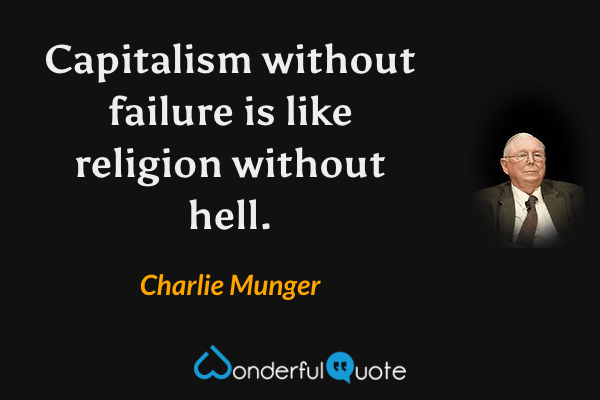
Capitalism without failure is like religion without hell.
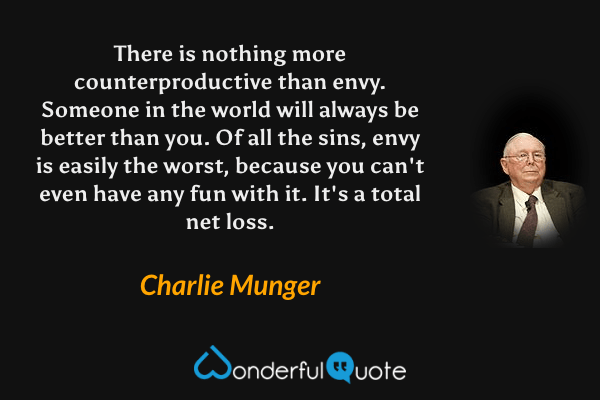
There is nothing more counterproductive than envy. Someone in the world will always be better than you. Of all the sins, envy is easily the worst, because you can't even have any fun with it. It's a total net loss.
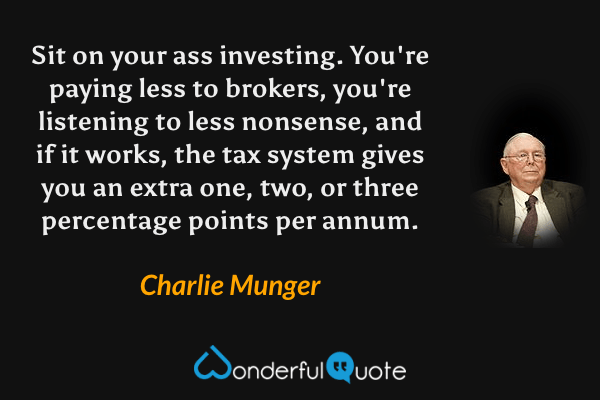
Sit on your ass investing. You're paying less to brokers, you're listening to less nonsense, and if it works, the tax system gives you an extra one, two, or three percentage points per annum.
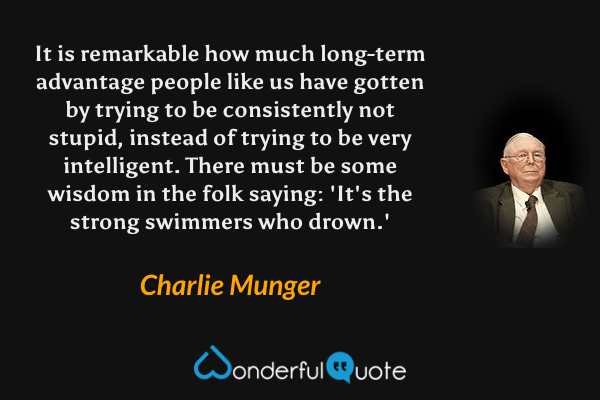
It is remarkable how much long-term advantage people like us have gotten by trying to be consistently not stupid, instead of trying to be very intelligent. There must be some wisdom in the folk saying: 'It's the strong swimmers who drown.'
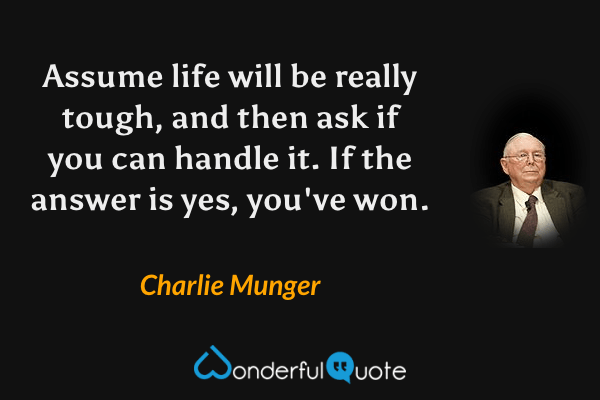
Assume life will be really tough, and then ask if you can handle it. If the answer is yes, you've won.

The best way to get a good spouse is to deserve a good spouse.
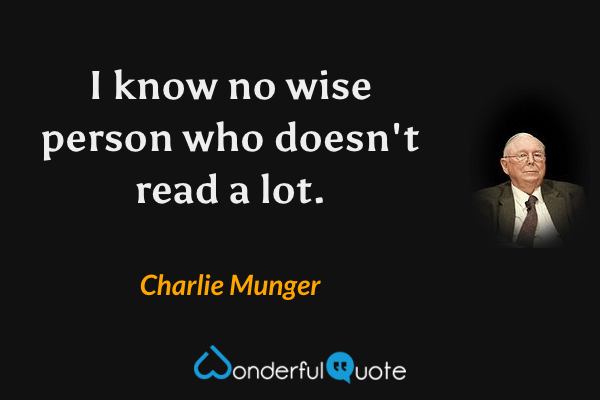
I know no wise person who doesn't read a lot.

In marriage, you shouldn't look for someone with good looks and character. You look for someone with low expectations.
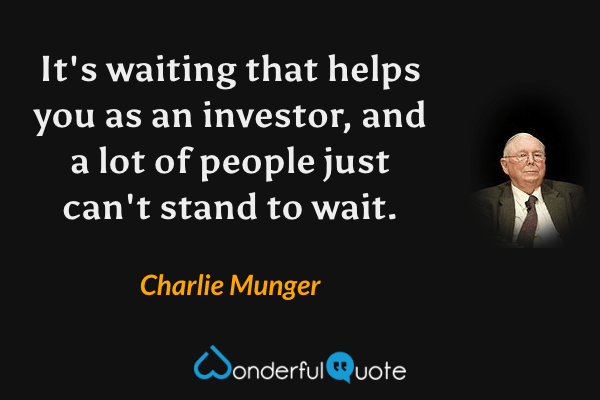
It's waiting that helps you as an investor, and a lot of people just can't stand to wait.
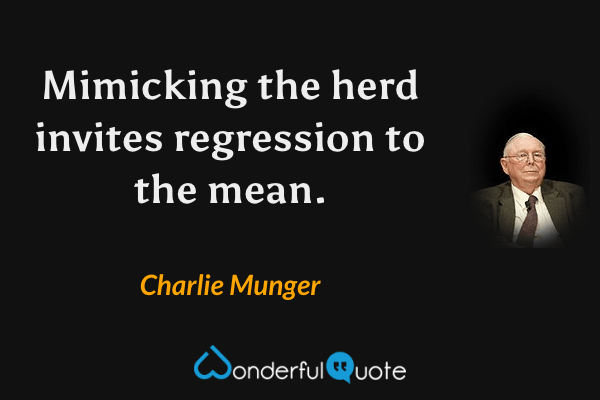
Mimicking the herd invites regression to the mean.
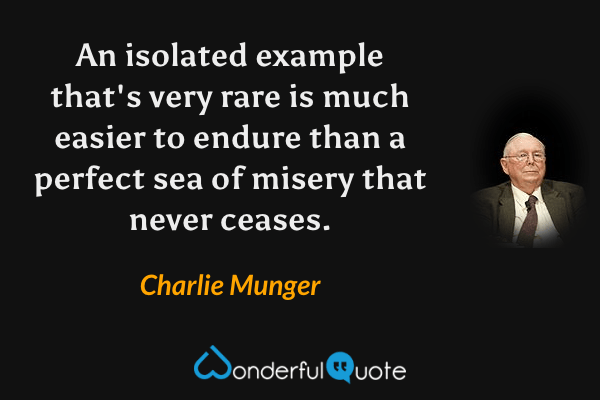
An isolated example that's very rare is much easier to endure than a perfect sea of misery that never ceases.
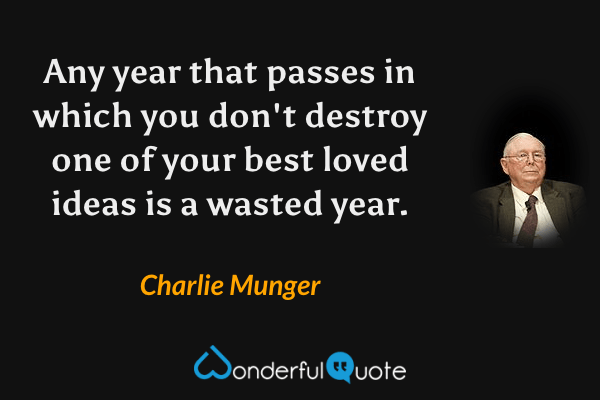
Any year that passes in which you don't destroy one of your best loved ideas is a wasted year.
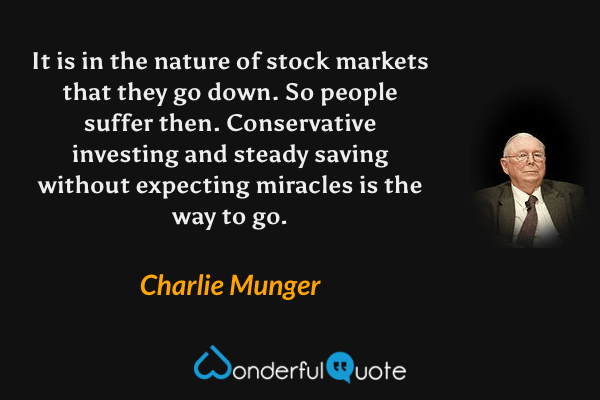
It is in the nature of stock markets that they go down. So people suffer then. Conservative investing and steady saving without expecting miracles is the way to go.
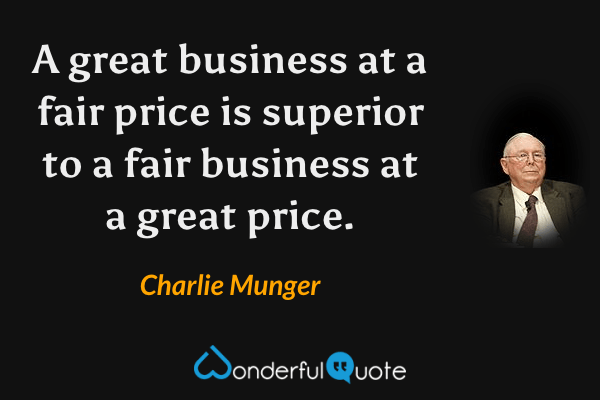
A great business at a fair price is superior to a fair business at a great price.
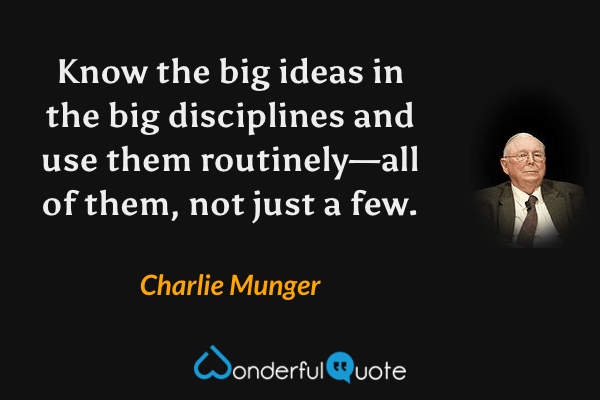
Know the big ideas in the big disciplines and use them routinely—all of them, not just a few.
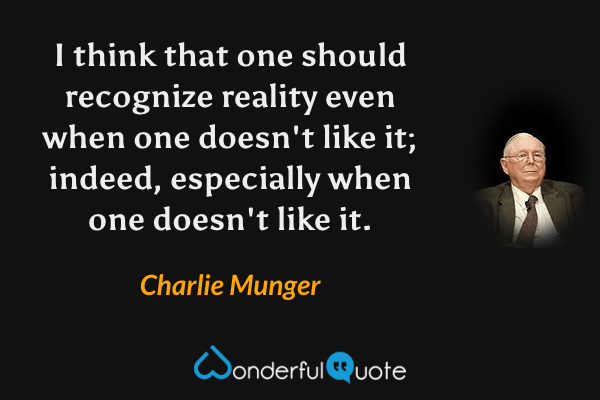
I think that one should recognize reality even when one doesn't like it; indeed, especially when one doesn't like it.
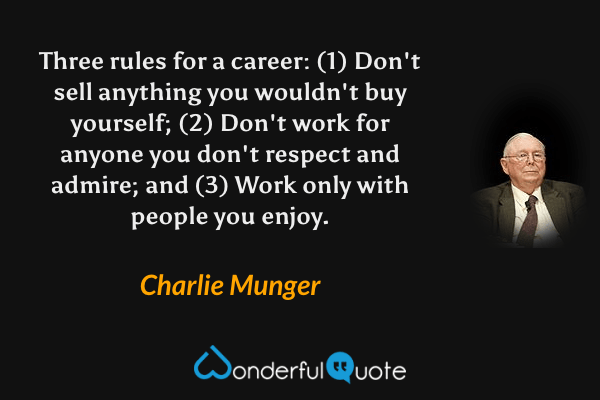
Three rules for a career: (1) Don't sell anything you wouldn't buy yourself; (2) Don't work for anyone you don't respect and admire; and (3) Work only with people you enjoy.
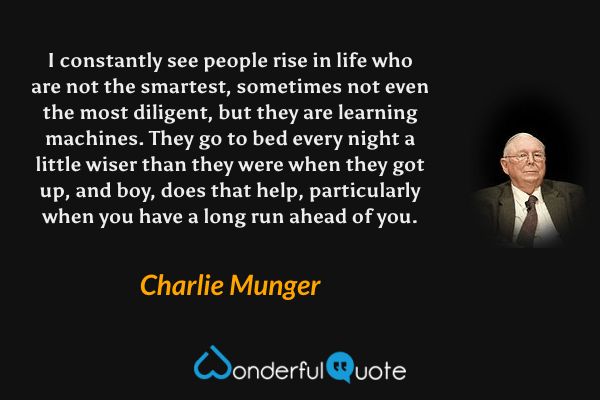
I constantly see people rise in life who are not the smartest, sometimes not even the most diligent, but they are learning machines. They go to bed every night a little wiser than they were when they got up, and boy, does that help, particularly when you have a long run ahead of you.
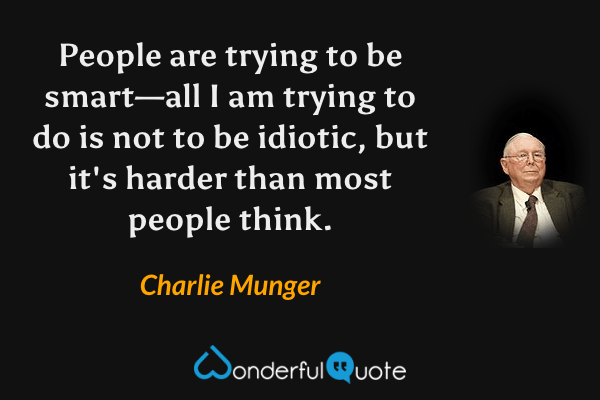
People are trying to be smart—all I am trying to do is not to be idiotic, but it's harder than most people think.
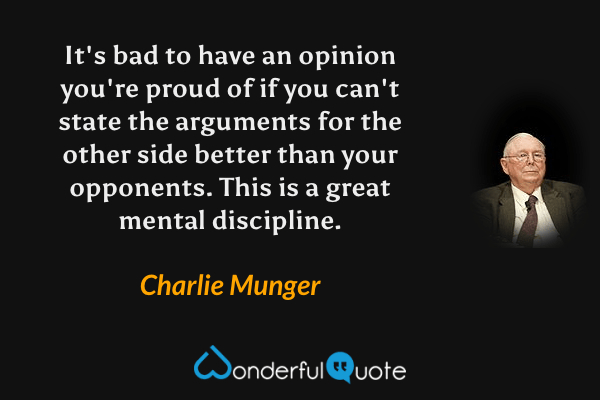
It's bad to have an opinion you're proud of if you can't state the arguments for the other side better than your opponents. This is a great mental discipline.
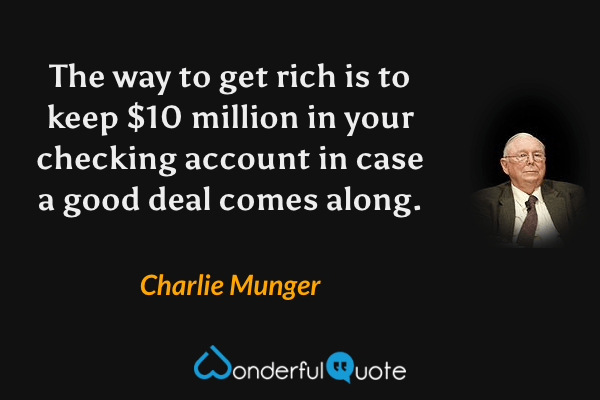
The way to get rich is to keep $10 million in your checking account in case a good deal comes along.

The best armor of old age is a well-spent life preceding it.
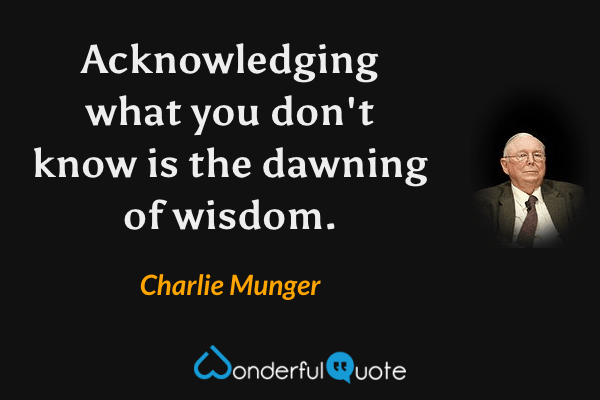
Acknowledging what you don't know is the dawning of wisdom.
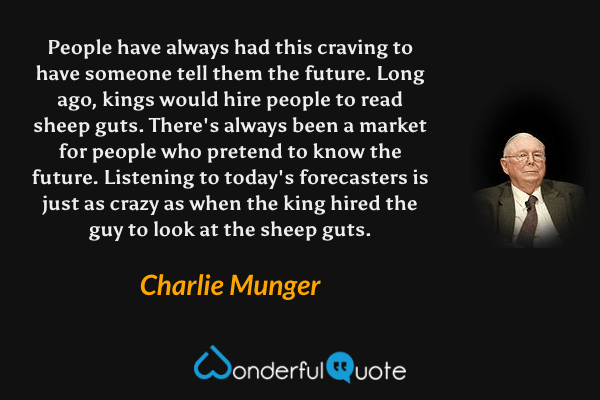
People have always had this craving to have someone tell them the future. Long ago, kings would hire people to read sheep guts. There's always been a market for people who pretend to know the future. Listening to today's forecasters is just as crazy as when the king hired the guy to look at the sheep guts.
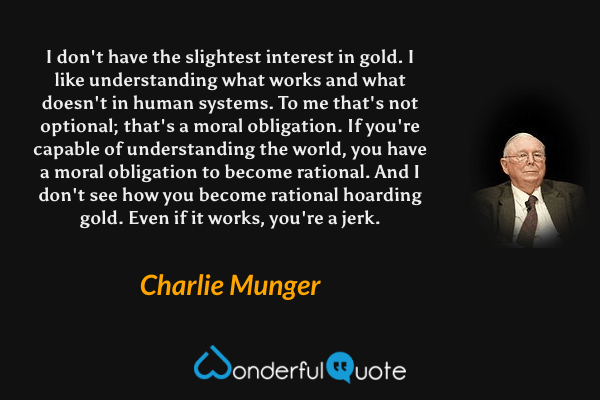
I don't have the slightest interest in gold. I like understanding what works and what doesn't in human systems. To me that's not optional; that's a moral obligation. If you're capable of understanding the world, you have a moral obligation to become rational. And I don't see how you become rational hoarding gold. Even if it works, you're a jerk.
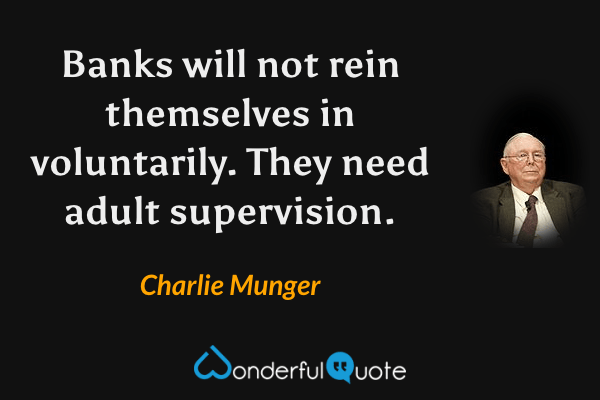
Banks will not rein themselves in voluntarily. They need adult supervision.
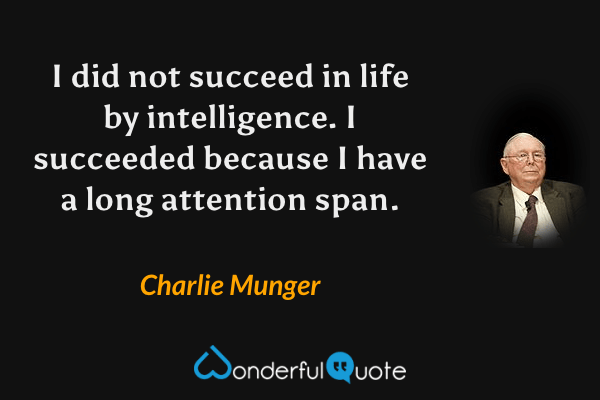
I did not succeed in life by intelligence. I succeeded because I have a long attention span.
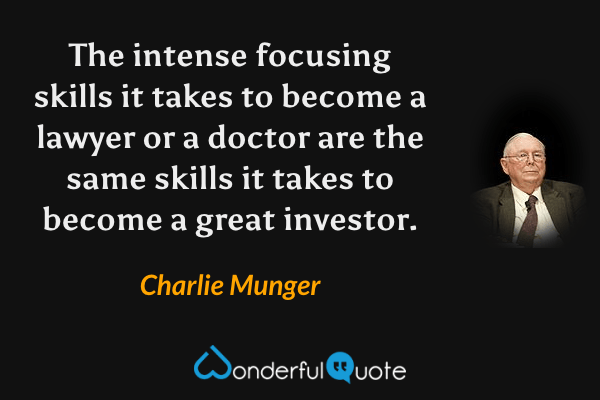
The intense focusing skills it takes to become a lawyer or a doctor are the same skills it takes to become a great investor.
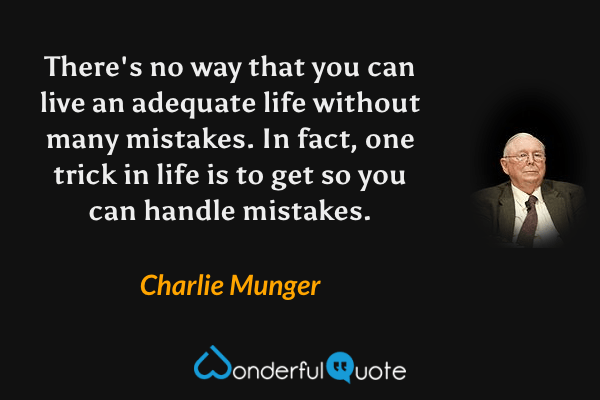
There's no way that you can live an adequate life without many mistakes. In fact, one trick in life is to get so you can handle mistakes.
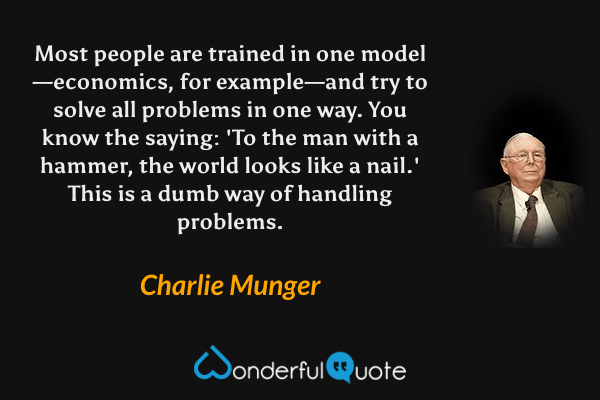
Most people are trained in one model—economics, for example—and try to solve all problems in one way. You know the saying: 'To the man with a hammer, the world looks like a nail.' This is a dumb way of handling problems.
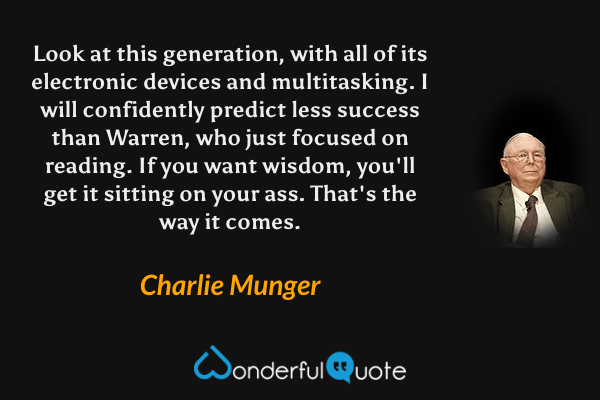
Look at this generation, with all of its electronic devices and multitasking. I will confidently predict less success than Warren, who just focused on reading. If you want wisdom, you'll get it sitting on your ass. That's the way it comes.
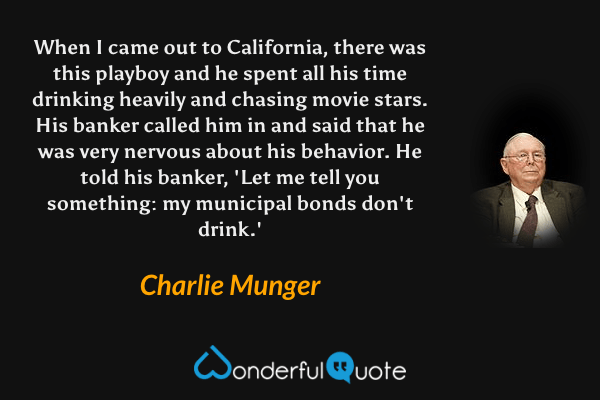
When I came out to California, there was this playboy and he spent all his time drinking heavily and chasing movie stars. His banker called him in and said that he was very nervous about his behavior. He told his banker, 'Let me tell you something: my municipal bonds don't drink.'
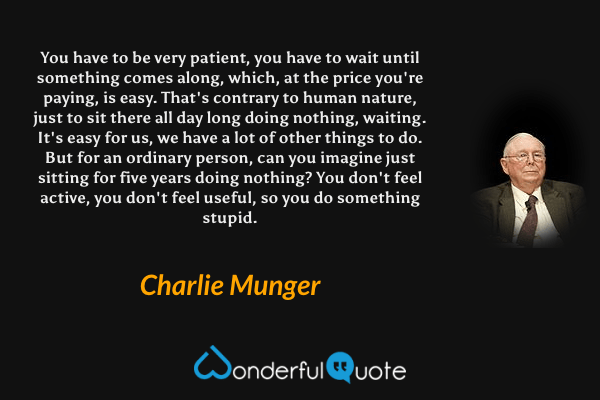
You have to be very patient, you have to wait until something comes along, which, at the price you're paying, is easy. That's contrary to human nature, just to sit there all day long doing nothing, waiting. It's easy for us, we have a lot of other things to do. But for an ordinary person, can you imagine just sitting for five years doing nothing? You don't feel active, you don't feel useful, so you do something stupid.
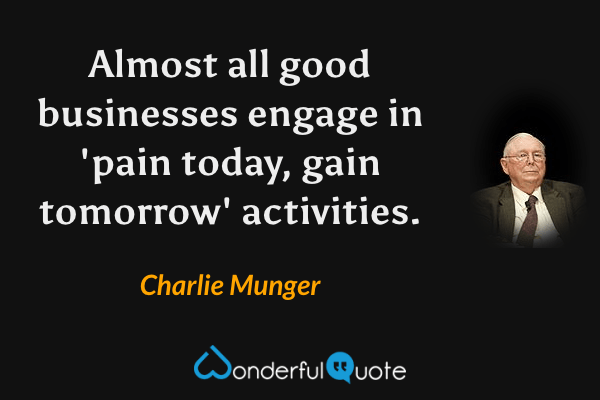
Almost all good businesses engage in 'pain today, gain tomorrow' activities.
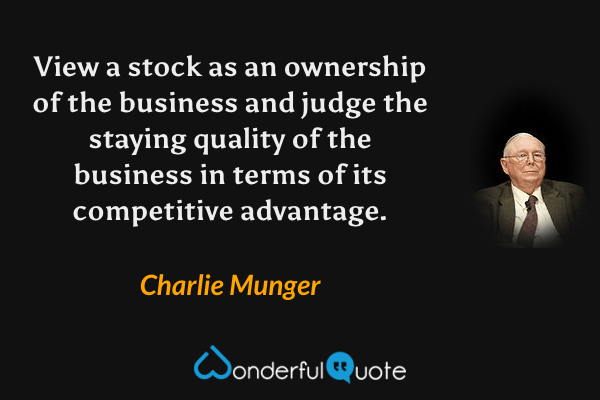
View a stock as an ownership of the business and judge the staying quality of the business in terms of its competitive advantage.
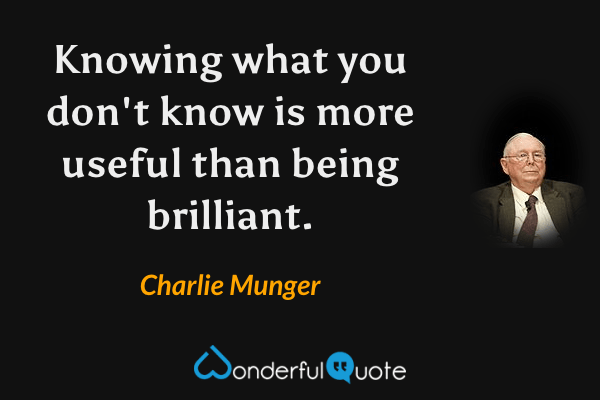
Knowing what you don't know is more useful than being brilliant.
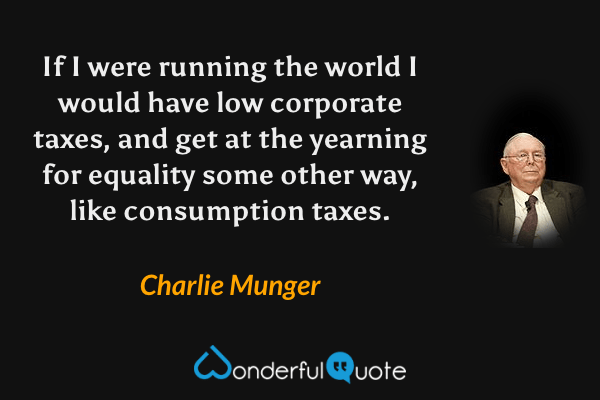
If I were running the world I would have low corporate taxes, and get at the yearning for equality some other way, like consumption taxes.
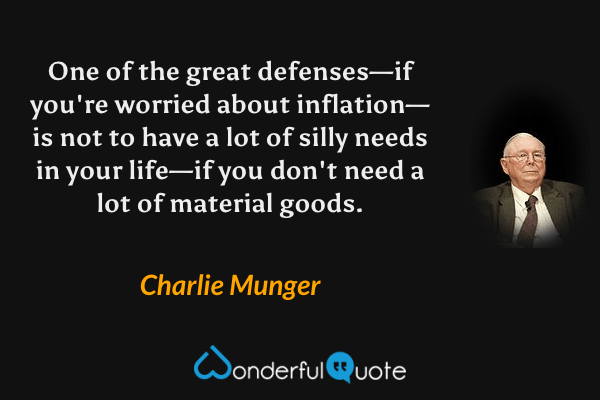
One of the great defenses—if you're worried about inflation—is not to have a lot of silly needs in your life—if you don't need a lot of material goods.
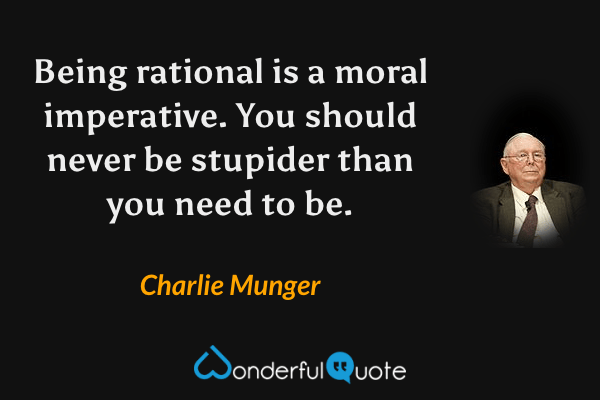
Being rational is a moral imperative. You should never be stupider than you need to be.
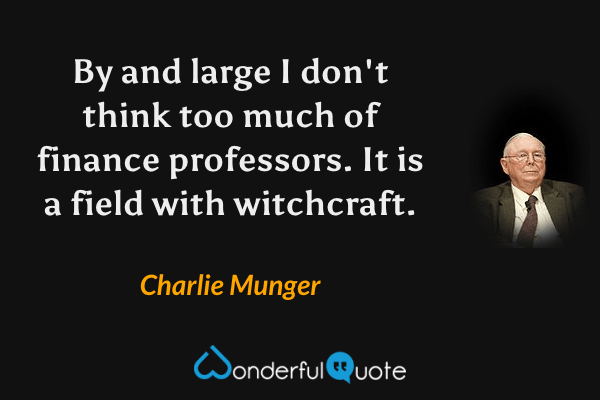
By and large I don't think too much of finance professors. It is a field with witchcraft.
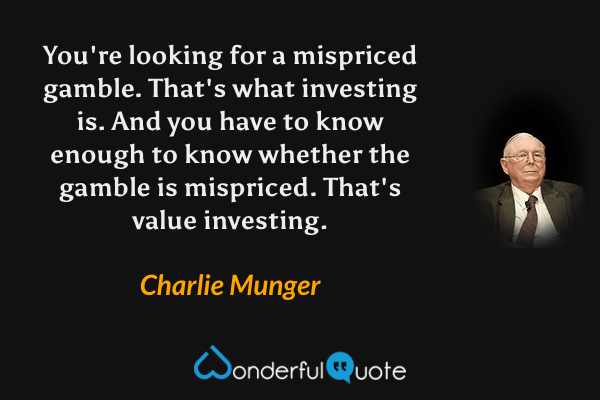
You're looking for a mispriced gamble. That's what investing is. And you have to know enough to know whether the gamble is mispriced. That's value investing.
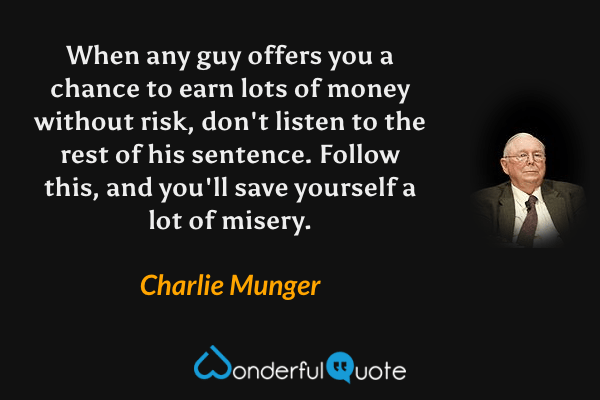
When any guy offers you a chance to earn lots of money without risk, don't listen to the rest of his sentence. Follow this, and you'll save yourself a lot of misery.
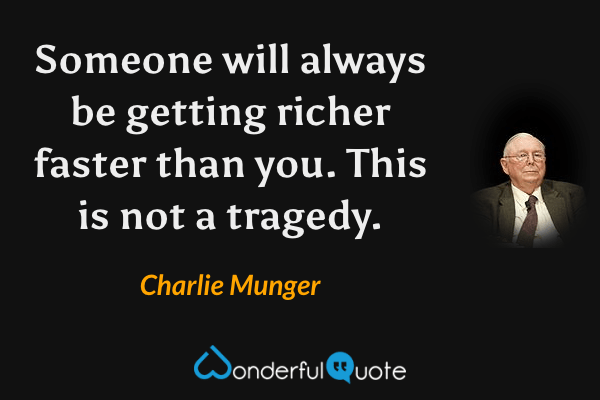
Someone will always be getting richer faster than you. This is not a tragedy.
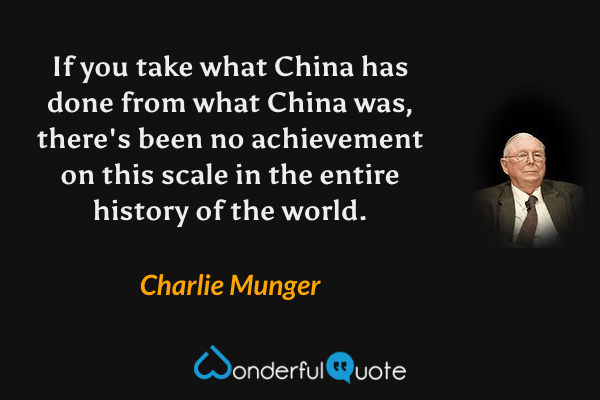
If you take what China has done from what China was, there's been no achievement on this scale in the entire history of the world.
![I get flack for saying [when I visit a college and give a speech], "This is a nice college, but the really great educator is McDonald's." They hate me for saying this and think I'm a slimy creature. But McDonald's hires people with bad work habits, trains them, and teaches them to come to work on time and have good work habits. I think a lot of what goes on there is better than at Harvard. - Charlie Munger quote.](/img/q/60/11960A-i-get-flack-for-saying-when-i-visit-college-give-charlie-munger.png)
I get flack for saying [when I visit a college and give a speech], "This is a nice college, but the really great educator is McDonald's." They hate me for saying this and think I'm a slimy creature. But McDonald's hires people with bad work habits, trains them, and teaches them to come to work on time and have good work habits. I think a lot of what goes on there is better than at Harvard.
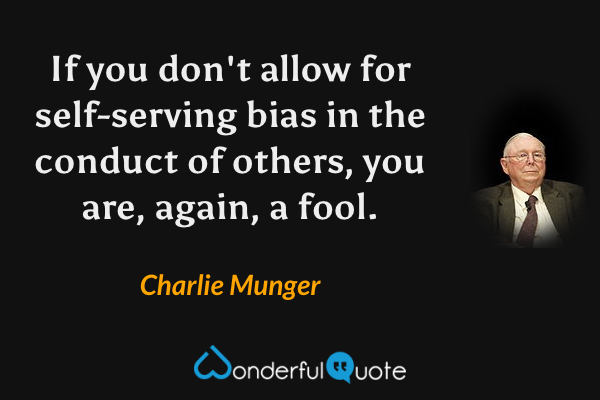
If you don't allow for self-serving bias in the conduct of others, you are, again, a fool.

I try to get rid of people who always confidently answer questions about which they don't have any real knowledge.
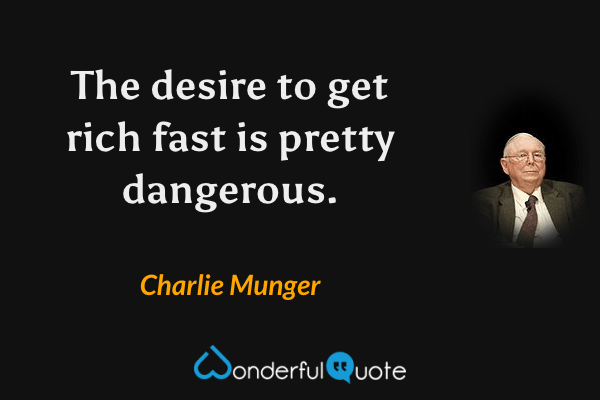
The desire to get rich fast is pretty dangerous.
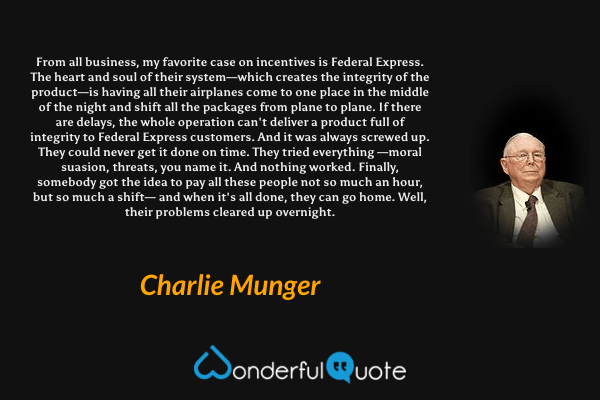
From all business, my favorite case on incentives is Federal Express. The heart and soul of their system—which creates the integrity of the product—is having all their airplanes come to one place in the middle of the night and shift all the packages from plane to plane. If there are delays, the whole operation can't deliver a product full of integrity to Federal Express customers. And it was always screwed up. They could never get it done on time. They tried everything —moral suasion, threats, you name it. And nothing worked. Finally, somebody got the idea to pay all these people not so much an hour, but so much a shift— and when it's all done, they can go home. Well, their problems cleared up overnight.
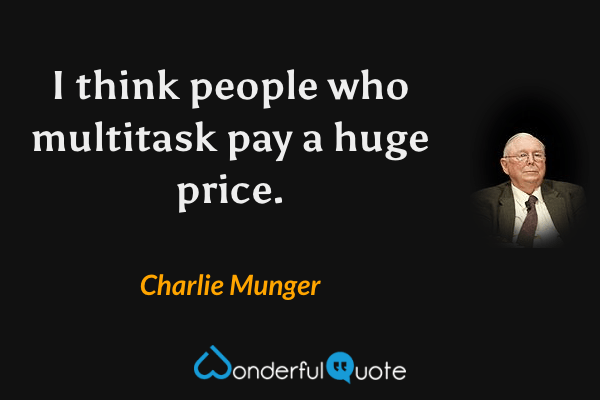
I think people who multitask pay a huge price.
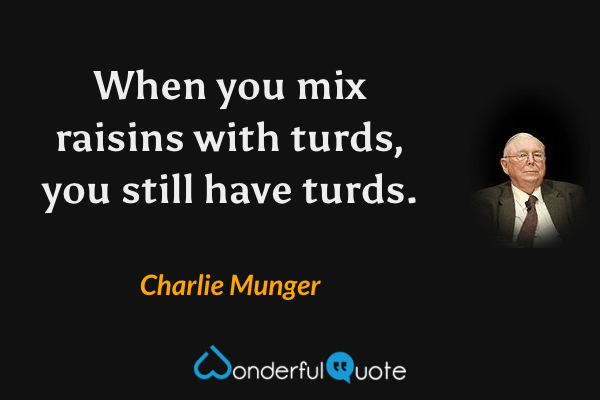
When you mix raisins with turds, you still have turds.
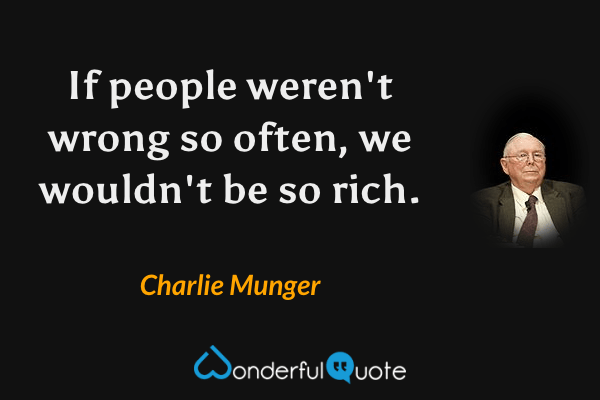
If people weren't wrong so often, we wouldn't be so rich.

There is more dementia about finance than there is about sex.
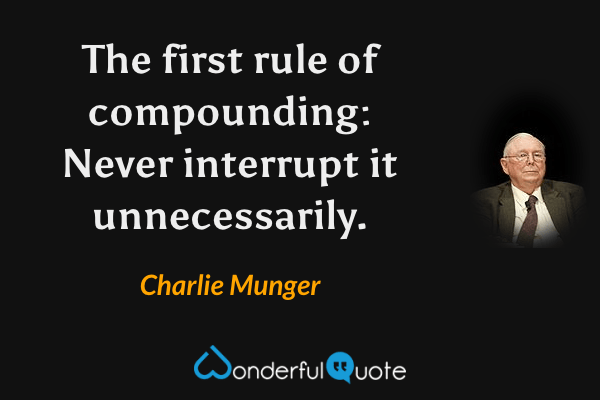
The first rule of compounding: Never interrupt it unnecessarily.

My idea of shooting a fish in a barrel is draining the barrel first.
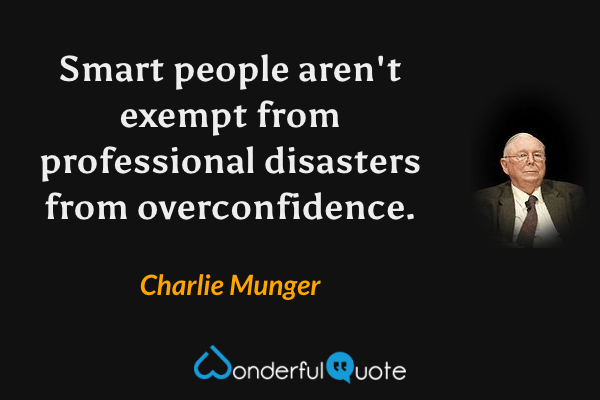
Smart people aren't exempt from professional disasters from overconfidence.
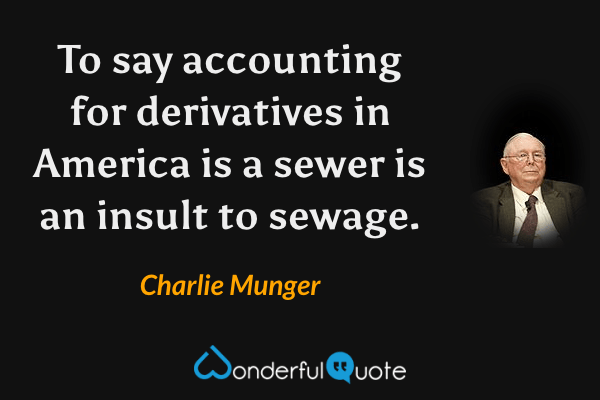
To say accounting for derivatives in America is a sewer is an insult to sewage.
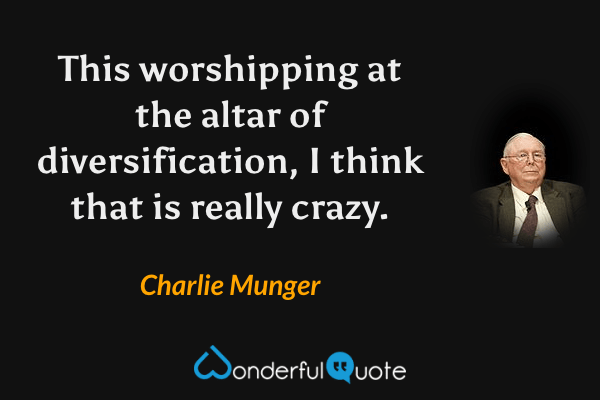
This worshipping at the altar of diversification, I think that is really crazy.
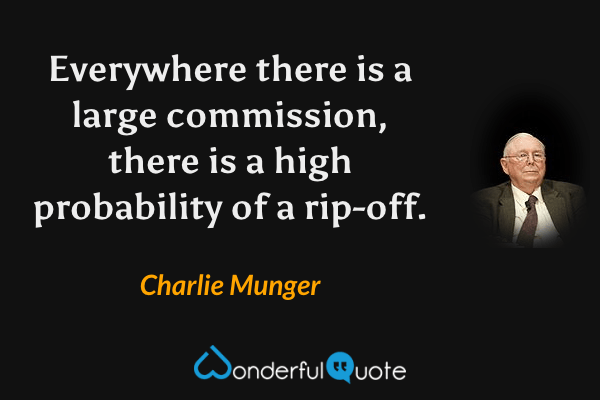
Everywhere there is a large commission, there is a high probability of a rip-off.
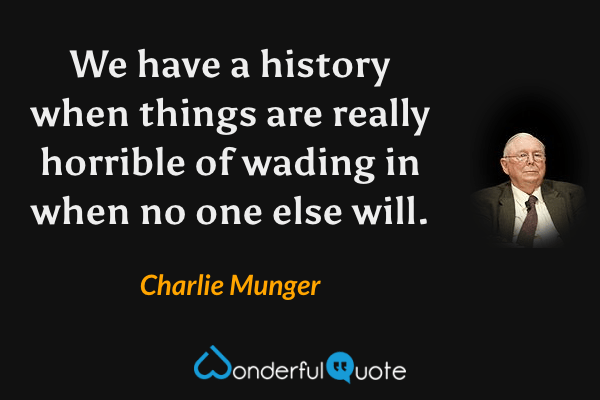
We have a history when things are really horrible of wading in when no one else will.
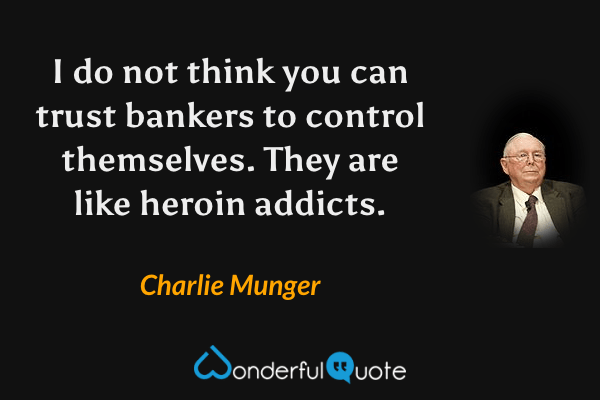
I do not think you can trust bankers to control themselves. They are like heroin addicts.
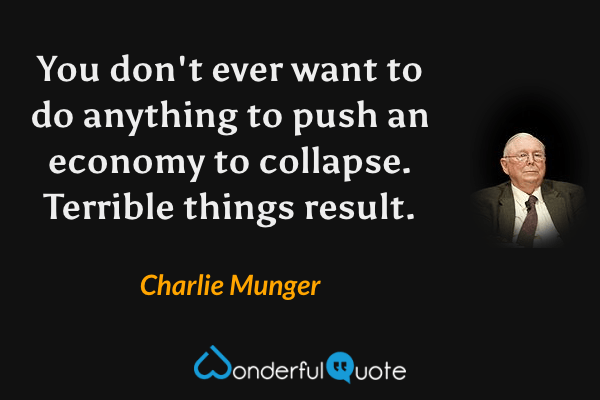
You don't ever want to do anything to push an economy to collapse. Terrible things result.
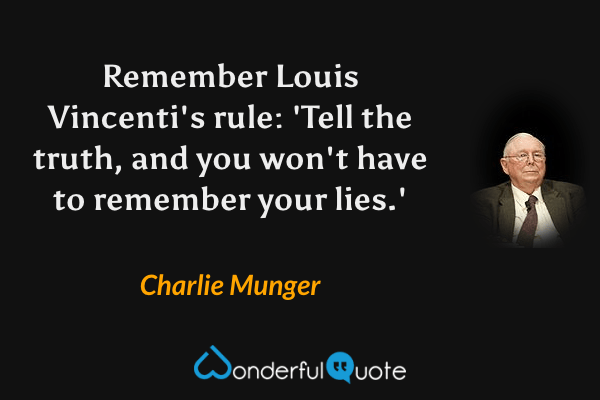
Remember Louis Vincenti's rule: 'Tell the truth, and you won't have to remember your lies.'
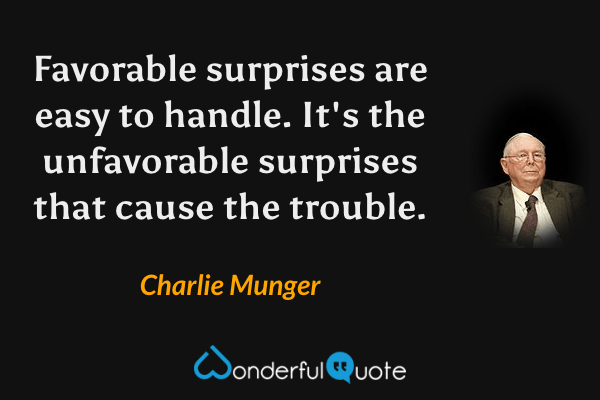
Favorable surprises are easy to handle. It's the unfavorable surprises that cause the trouble.
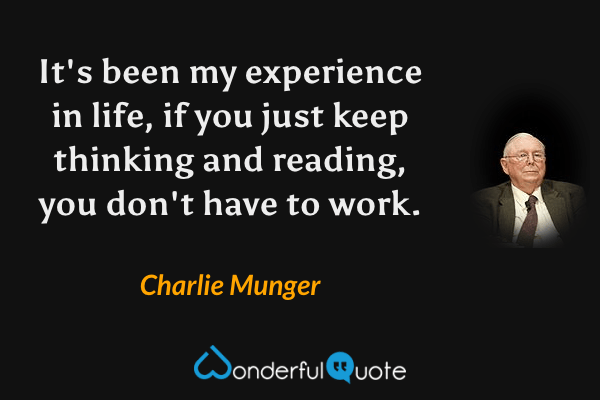
It's been my experience in life, if you just keep thinking and reading, you don't have to work.
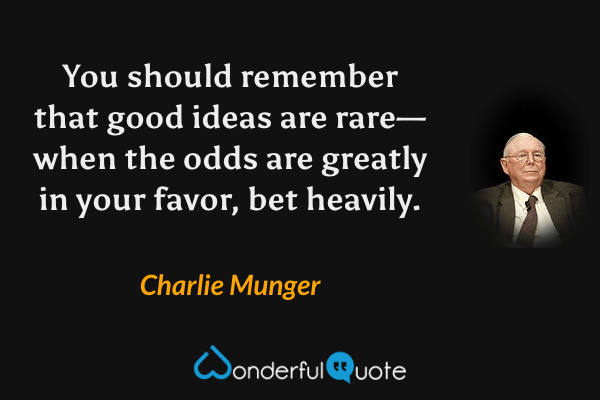
You should remember that good ideas are rare—when the odds are greatly in your favor, bet heavily.

I like Wal-Mart's culture. As far as I'm concerned, Wal-Mart is one of the glories of civilization.

I like you all because you remind me of myself. Who doesn't like his own image staring back at him?
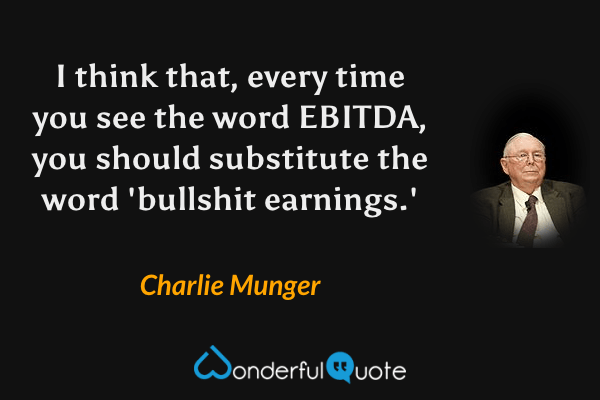
I think that, every time you see the word EBITDA, you should substitute the word 'bullshit earnings.'
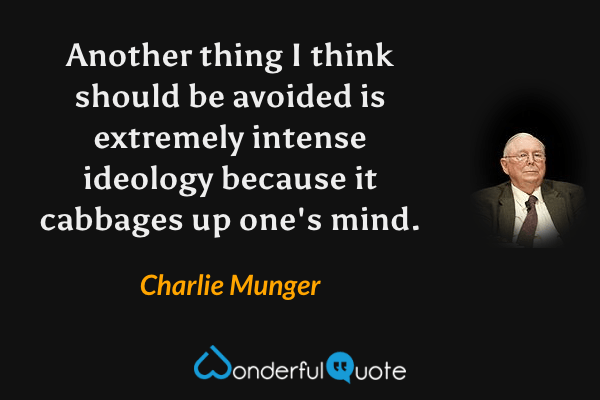
Another thing I think should be avoided is extremely intense ideology because it cabbages up one's mind.
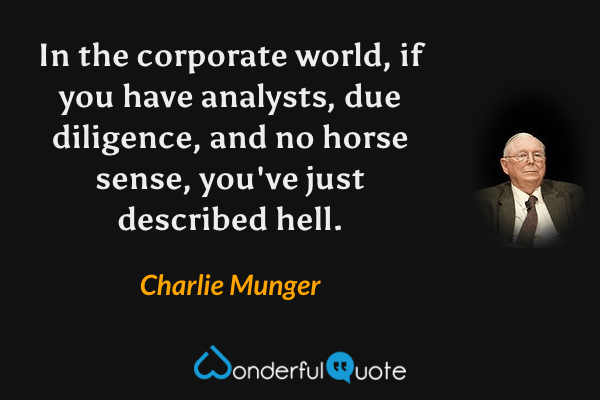
In the corporate world, if you have analysts, due diligence, and no horse sense, you've just described hell.
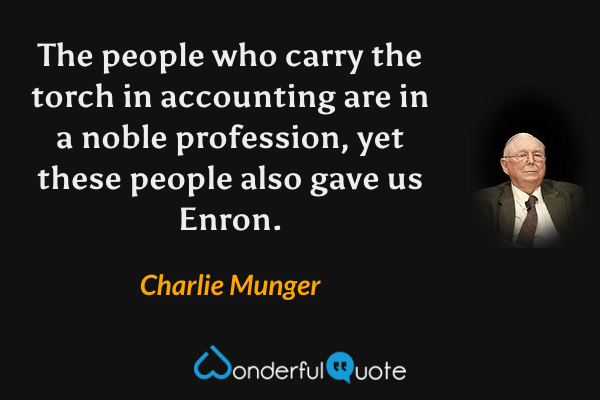
The people who carry the torch in accounting are in a noble profession, yet these people also gave us Enron.

Even the best banks drift with the times and do stupid things, but I suspect Wells Fargo will face up to it better.
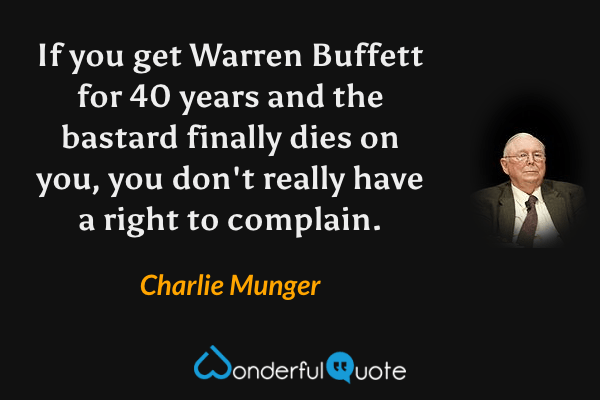
If you get Warren Buffett for 40 years and the bastard finally dies on you, you don't really have a right to complain.
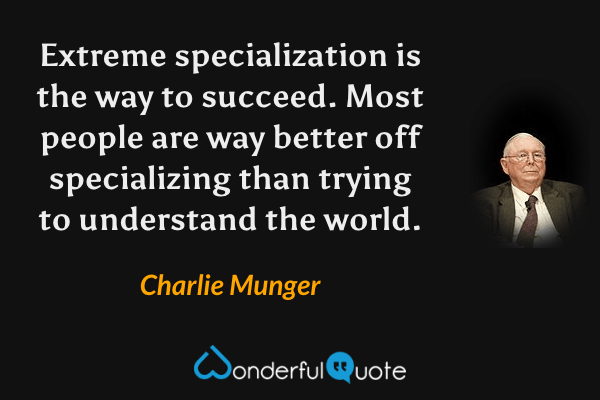
Extreme specialization is the way to succeed. Most people are way better off specializing than trying to understand the world.
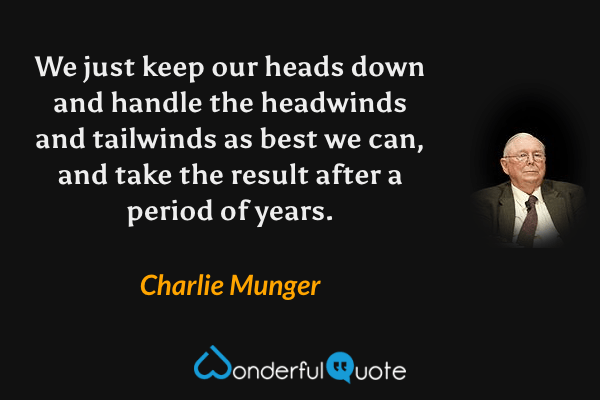
We just keep our heads down and handle the headwinds and tailwinds as best we can, and take the result after a period of years.
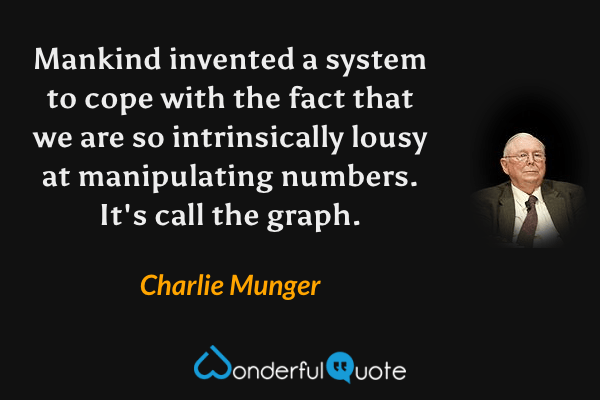
Mankind invented a system to cope with the fact that we are so intrinsically lousy at manipulating numbers. It's call the graph.
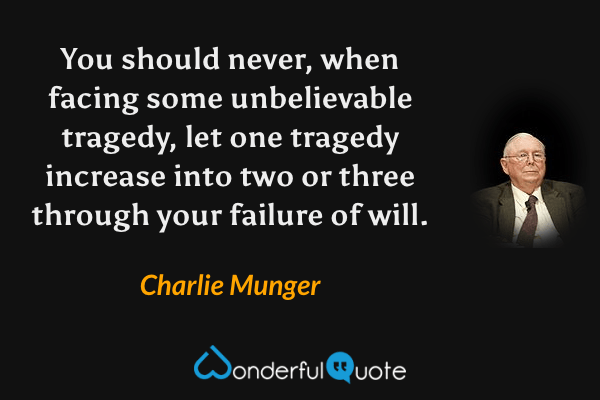
You should never, when facing some unbelievable tragedy, let one tragedy increase into two or three through your failure of will.
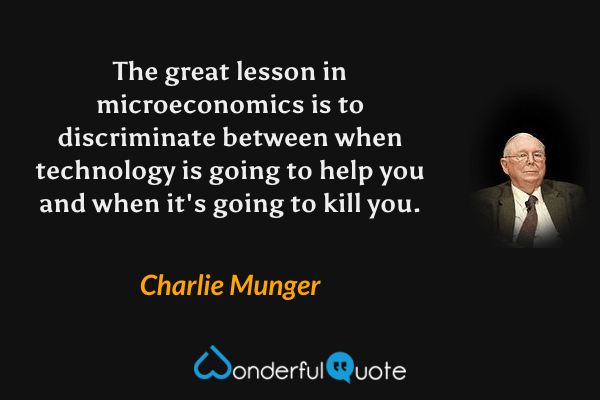
The great lesson in microeconomics is to discriminate between when technology is going to help you and when it's going to kill you.
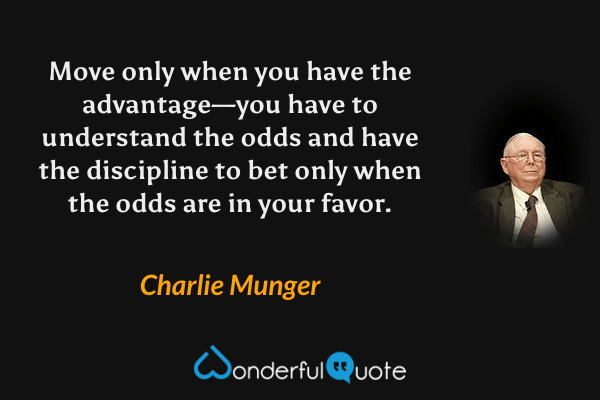
Move only when you have the advantage—you have to understand the odds and have the discipline to bet only when the odds are in your favor.
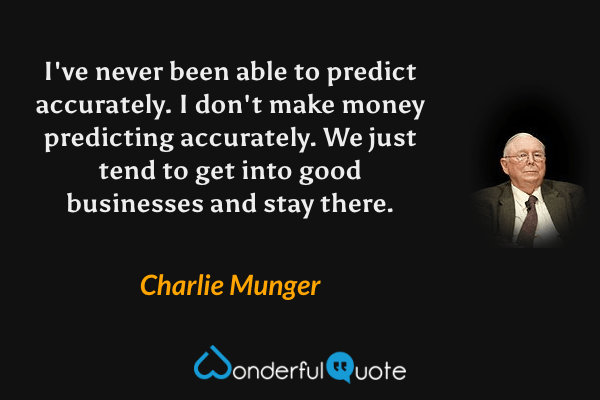
I've never been able to predict accurately. I don't make money predicting accurately. We just tend to get into good businesses and stay there.
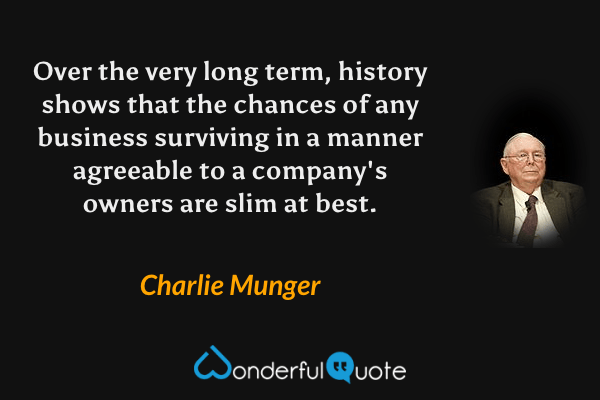
Over the very long term, history shows that the chances of any business surviving in a manner agreeable to a company's owners are slim at best.
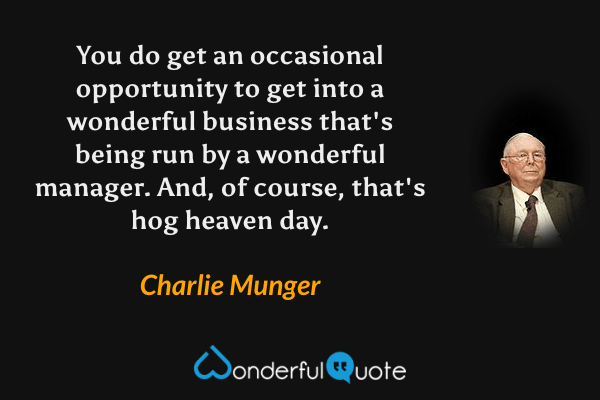
You do get an occasional opportunity to get into a wonderful business that's being run by a wonderful manager. And, of course, that's hog heaven day.
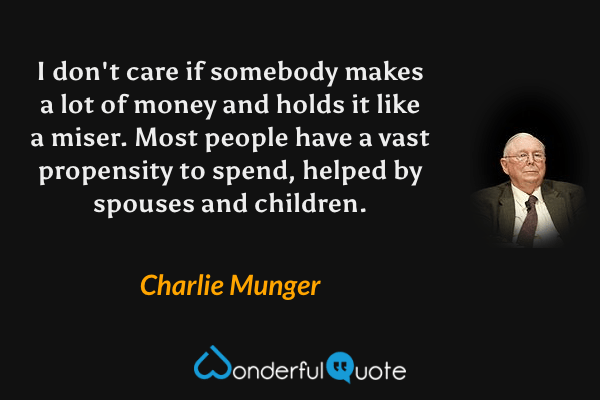
I don't care if somebody makes a lot of money and holds it like a miser. Most people have a vast propensity to spend, helped by spouses and children.
![How is [Berkshire] organized? I don't think in [the] history of the world has anything Berkshire's size [been] organized in so decentralized a fashion. - Charlie Munger quote.](/img/q/57/11957A-how-is-berkshire-organized-i-dont-think-history-world-has-charlie-munger.png)
How is [Berkshire] organized? I don't think in [the] history of the world has anything Berkshire's size [been] organized in so decentralized a fashion.

They once asked me what one person accounted for most of my personal felicity in life, and I said, 'That's easy—that would be my wife's first husband.'
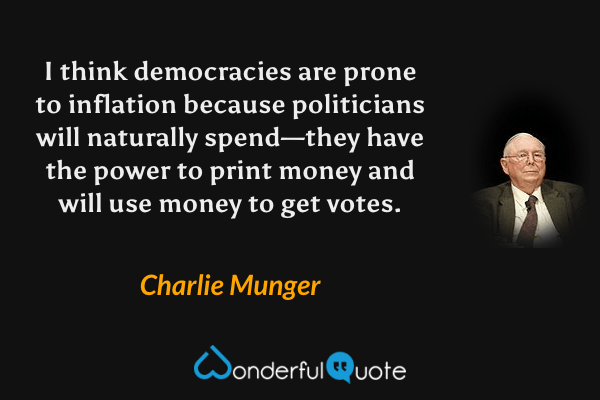
I think democracies are prone to inflation because politicians will naturally spend—they have the power to print money and will use money to get votes.
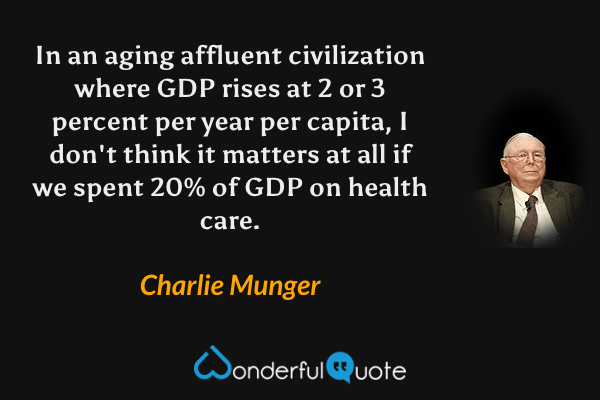
In an aging affluent civilization where GDP rises at 2 or 3 percent per year per capita, I don't think it matters at all if we spent 20% of GDP on health care.
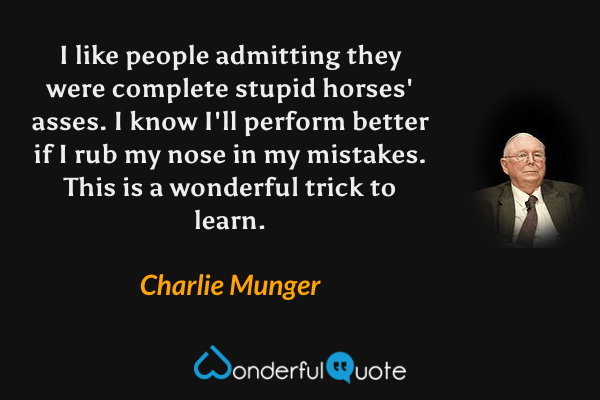
I like people admitting they were complete stupid horses' asses. I know I'll perform better if I rub my nose in my mistakes. This is a wonderful trick to learn.

I'm getting more experienced at aging. I'm like the man who jumped off the skyscraper and at the 5th floor on the way down says, 'So far this is not a bad ride.'
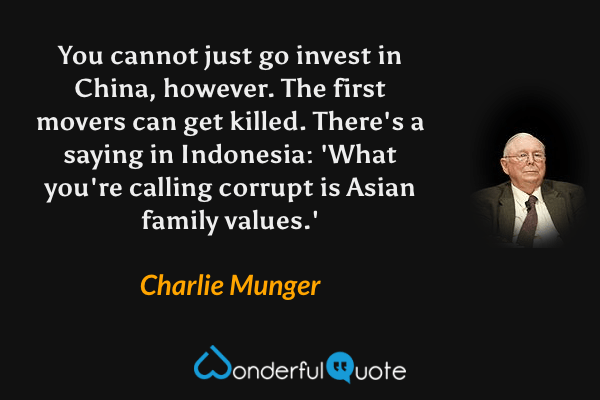
You cannot just go invest in China, however. The first movers can get killed. There's a saying in Indonesia: 'What you're calling corrupt is Asian family values.'

The world of derivatives is full of holes that very few people are really aware of. It's like hydrogen and oxygen sitting on the corner waiting for a little flame.
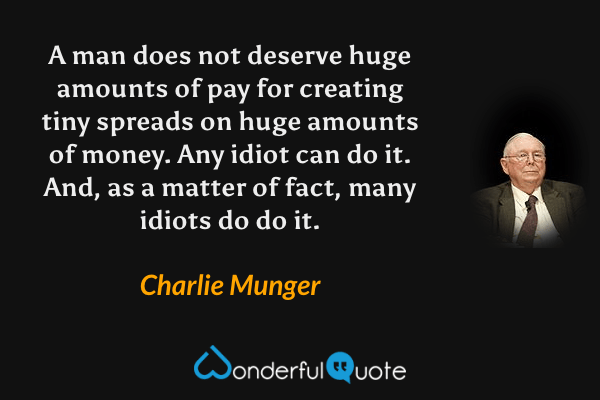
A man does not deserve huge amounts of pay for creating tiny spreads on huge amounts of money. Any idiot can do it. And, as a matter of fact, many idiots do do it.
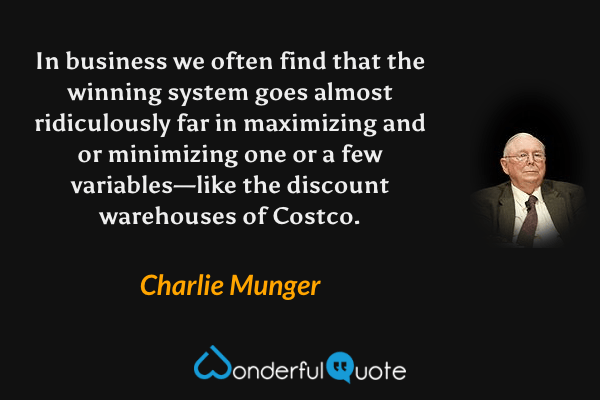
In business we often find that the winning system goes almost ridiculously far in maximizing and or minimizing one or a few variables—like the discount warehouses of Costco.
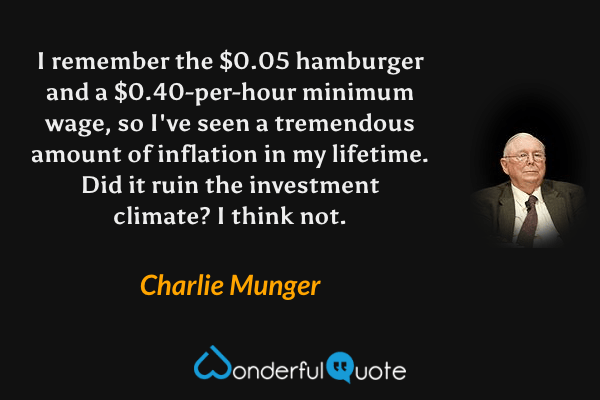
I remember the $0.05 hamburger and a $0.40-per-hour minimum wage, so I've seen a tremendous amount of inflation in my lifetime. Did it ruin the investment climate? I think not.
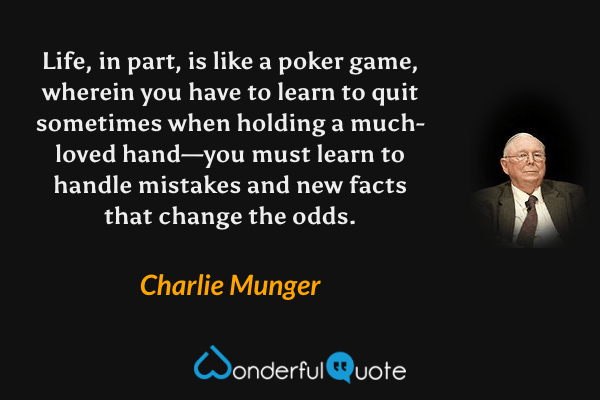
Life, in part, is like a poker game, wherein you have to learn to quit sometimes when holding a much-loved hand—you must learn to handle mistakes and new facts that change the odds.
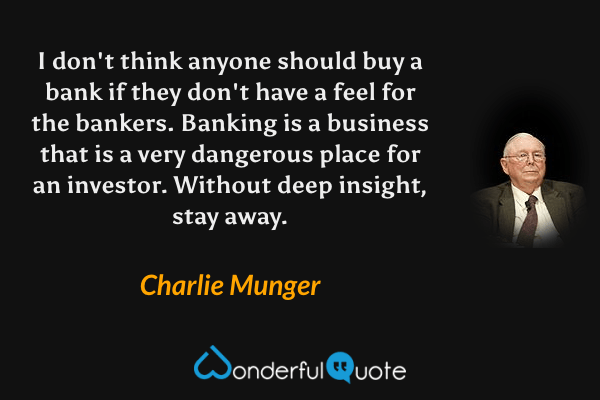
I don't think anyone should buy a bank if they don't have a feel for the bankers. Banking is a business that is a very dangerous place for an investor. Without deep insight, stay away.
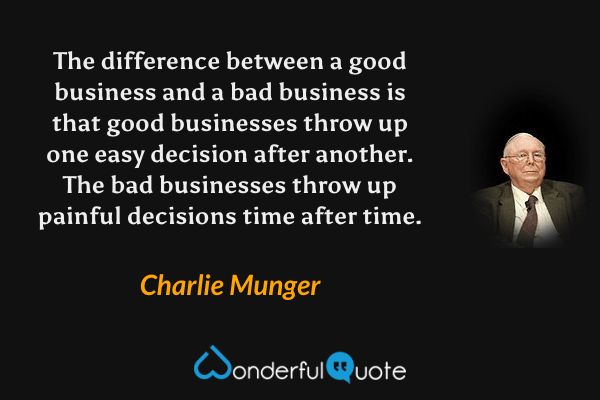
The difference between a good business and a bad business is that good businesses throw up one easy decision after another. The bad businesses throw up painful decisions time after time.
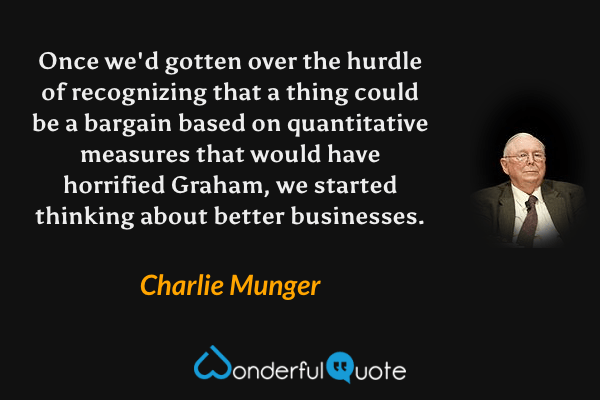
Once we'd gotten over the hurdle of recognizing that a thing could be a bargain based on quantitative measures that would have horrified Graham, we started thinking about better businesses.
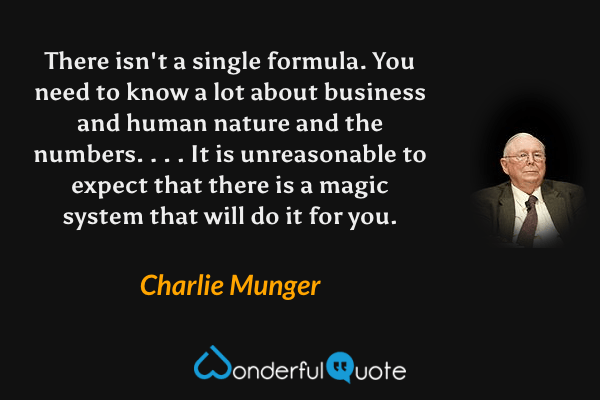
There isn't a single formula. You need to know a lot about business and human nature and the numbers. . . . It is unreasonable to expect that there is a magic system that will do it for you.
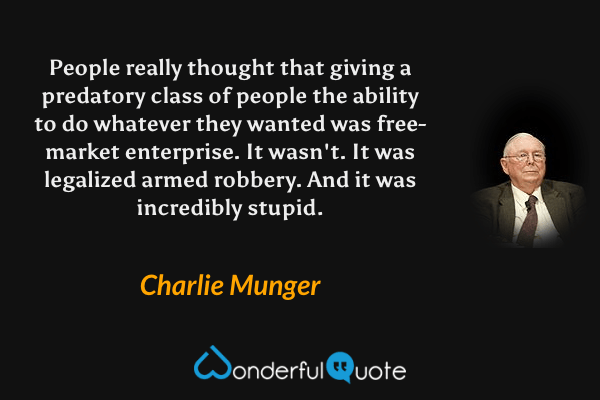
People really thought that giving a predatory class of people the ability to do whatever they wanted was free-market enterprise. It wasn't. It was legalized armed robbery. And it was incredibly stupid.
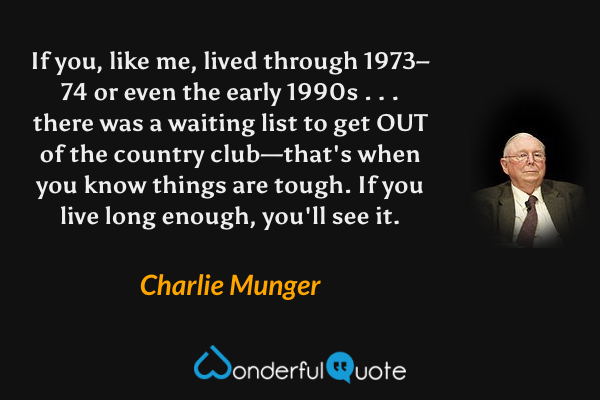
If you, like me, lived through 1973–74 or even the early 1990s . . . there was a waiting list to get OUT of the country club—that's when you know things are tough. If you live long enough, you'll see it.
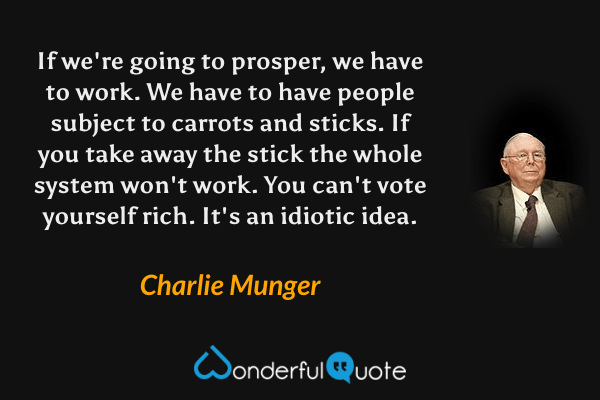
If we're going to prosper, we have to work. We have to have people subject to carrots and sticks. If you take away the stick the whole system won't work. You can't vote yourself rich. It's an idiotic idea.
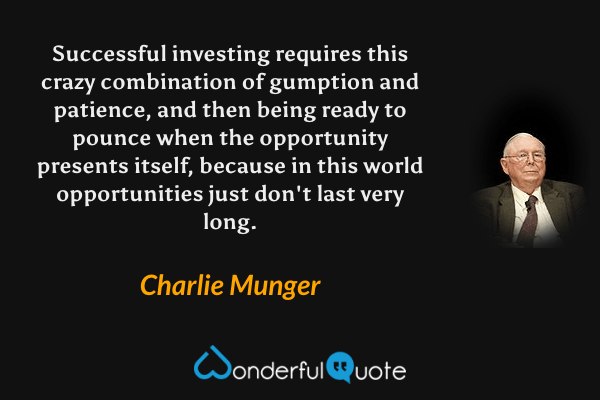
Successful investing requires this crazy combination of gumption and patience, and then being ready to pounce when the opportunity presents itself, because in this world opportunities just don't last very long.
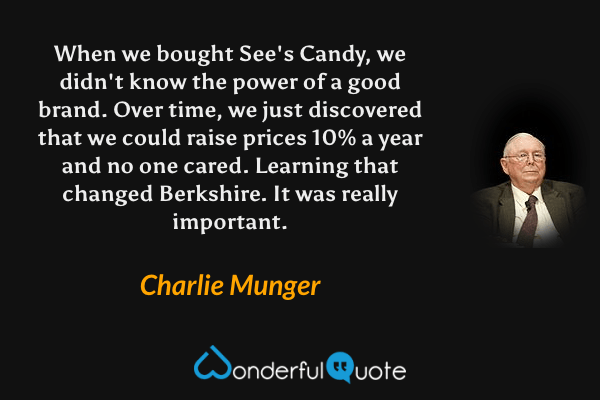
When we bought See's Candy, we didn't know the power of a good brand. Over time, we just discovered that we could raise prices 10% a year and no one cared. Learning that changed Berkshire. It was really important.

I have never succeeded very much in anything in which I was not very interested. If you can't somehow find yourself very interested in something, I don't think you'll succeed very much, even if you're fairly smart.
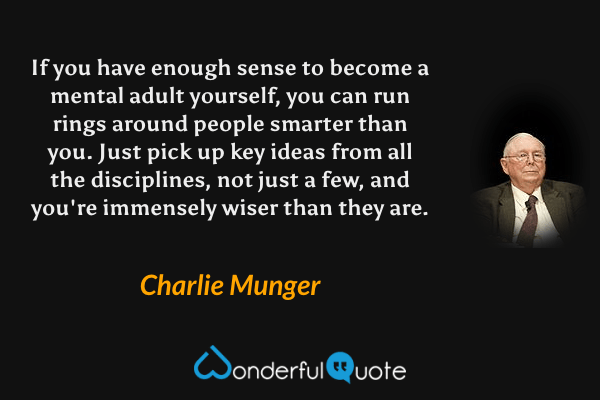
If you have enough sense to become a mental adult yourself, you can run rings around people smarter than you. Just pick up key ideas from all the disciplines, not just a few, and you're immensely wiser than they are.
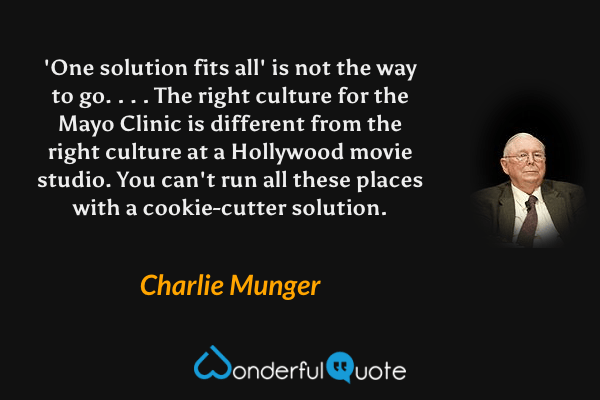
'One solution fits all' is not the way to go. . . . The right culture for the Mayo Clinic is different from the right culture at a Hollywood movie studio. You can't run all these places with a cookie-cutter solution.
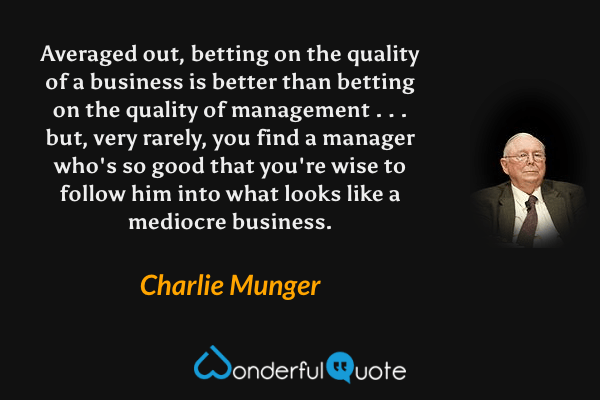
Averaged out, betting on the quality of a business is better than betting on the quality of management . . . but, very rarely, you find a manager who's so good that you're wise to follow him into what looks like a mediocre business.
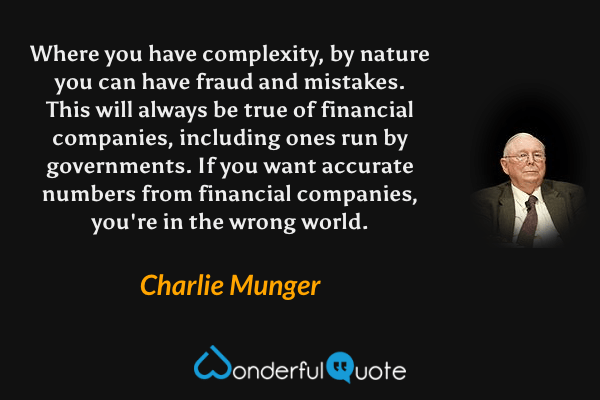
Where you have complexity, by nature you can have fraud and mistakes. This will always be true of financial companies, including ones run by governments. If you want accurate numbers from financial companies, you're in the wrong world.
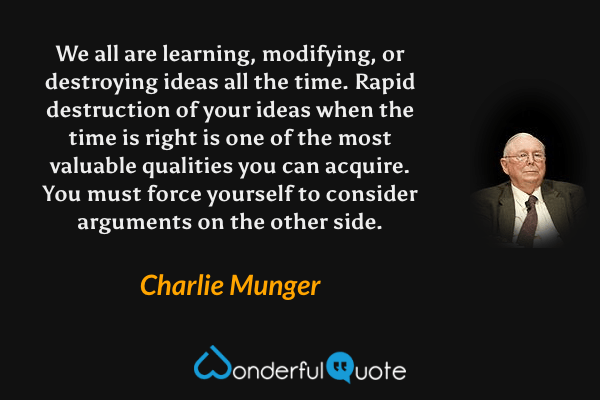
We all are learning, modifying, or destroying ideas all the time. Rapid destruction of your ideas when the time is right is one of the most valuable qualities you can acquire. You must force yourself to consider arguments on the other side.
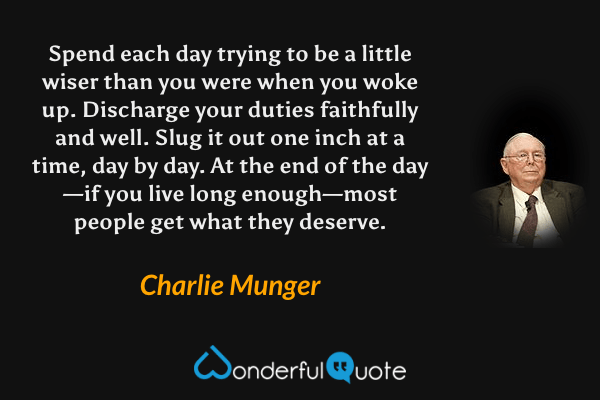
Spend each day trying to be a little wiser than you were when you woke up. Discharge your duties faithfully and well. Slug it out one inch at a time, day by day. At the end of the day—if you live long enough—most people get what they deserve.
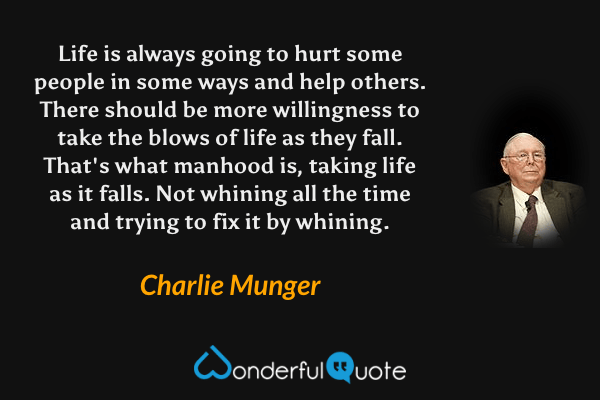
Life is always going to hurt some people in some ways and help others. There should be more willingness to take the blows of life as they fall. That's what manhood is, taking life as it falls. Not whining all the time and trying to fix it by whining.
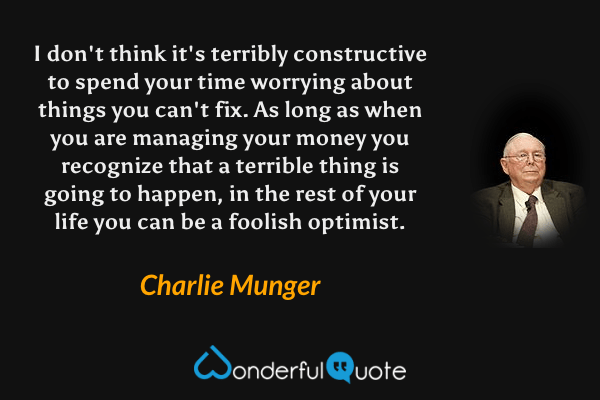
I don't think it's terribly constructive to spend your time worrying about things you can't fix. As long as when you are managing your money you recognize that a terrible thing is going to happen, in the rest of your life you can be a foolish optimist.
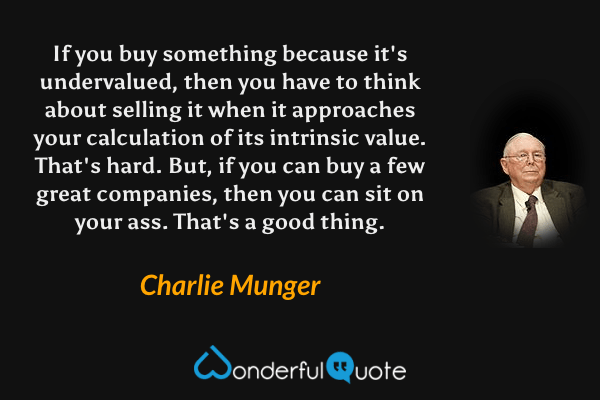
If you buy something because it's undervalued, then you have to think about selling it when it approaches your calculation of its intrinsic value. That's hard. But, if you can buy a few great companies, then you can sit on your ass. That's a good thing.
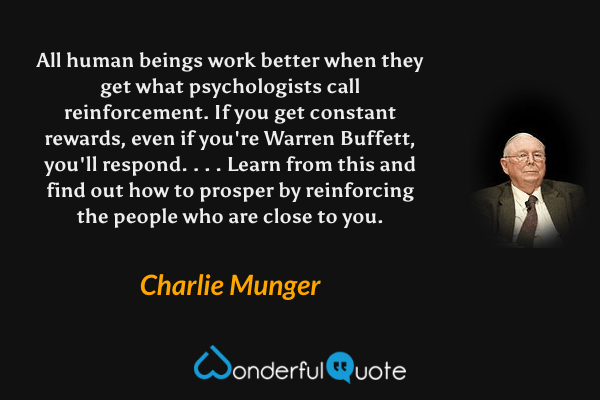
All human beings work better when they get what psychologists call reinforcement. If you get constant rewards, even if you're Warren Buffett, you'll respond. . . . Learn from this and find out how to prosper by reinforcing the people who are close to you.
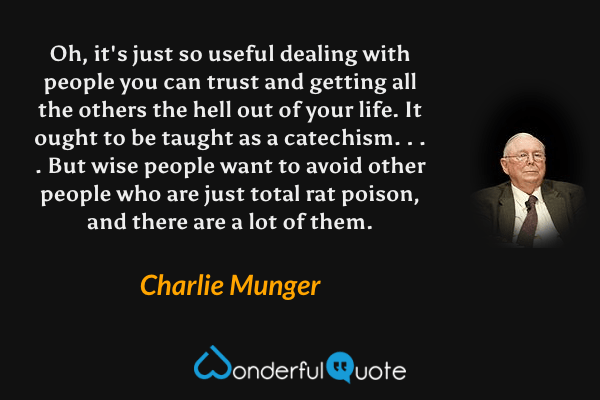
Oh, it's just so useful dealing with people you can trust and getting all the others the hell out of your life. It ought to be taught as a catechism. . . . But wise people want to avoid other people who are just total rat poison, and there are a lot of them.
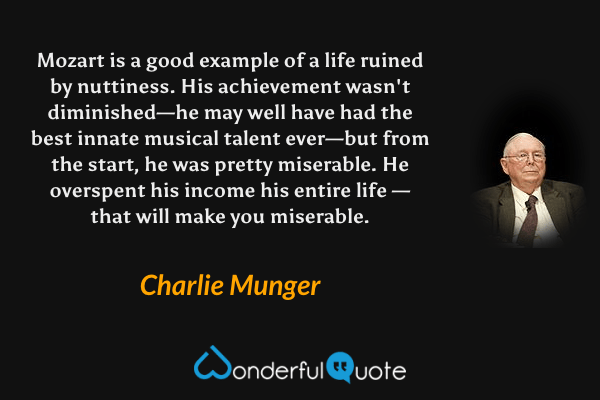
Mozart is a good example of a life ruined by nuttiness. His achievement wasn't diminished—he may well have had the best innate musical talent ever—but from the start, he was pretty miserable. He overspent his income his entire life —that will make you miserable.
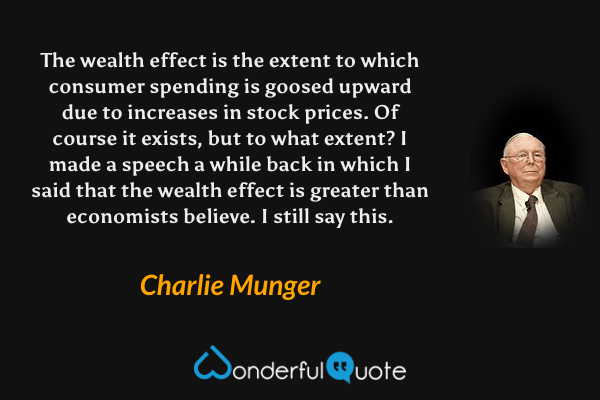
The wealth effect is the extent to which consumer spending is goosed upward due to increases in stock prices. Of course it exists, but to what extent? I made a speech a while back in which I said that the wealth effect is greater than economists believe. I still say this.
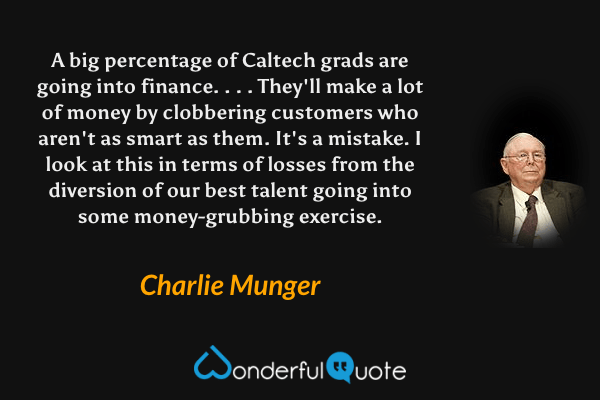
A big percentage of Caltech grads are going into finance. . . . They'll make a lot of money by clobbering customers who aren't as smart as them. It's a mistake. I look at this in terms of losses from the diversion of our best talent going into some money-grubbing exercise.
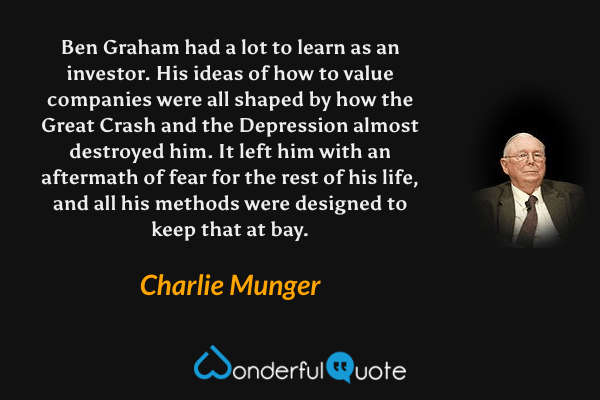
Ben Graham had a lot to learn as an investor. His ideas of how to value companies were all shaped by how the Great Crash and the Depression almost destroyed him. It left him with an aftermath of fear for the rest of his life, and all his methods were designed to keep that at bay.
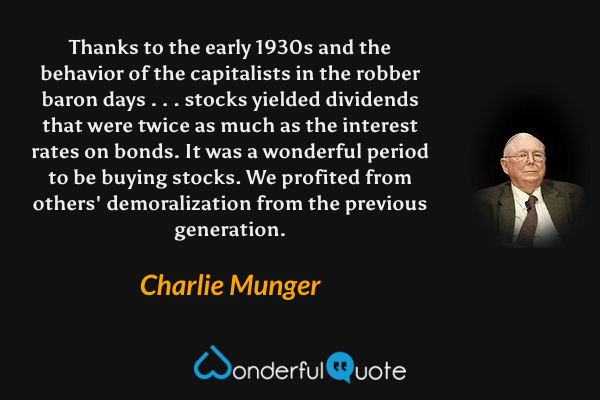
Thanks to the early 1930s and the behavior of the capitalists in the robber baron days . . . stocks yielded dividends that were twice as much as the interest rates on bonds. It was a wonderful period to be buying stocks. We profited from others' demoralization from the previous generation.

When Hitler was in his bunker before he shot himself, he said, 'This isn't my fault. The German people just don't appreciate me enough.' That's the attitude of a lot of bankers. They think their silliness is necessary. Banks will not rein themselves in voluntarily. You need adult supervision.
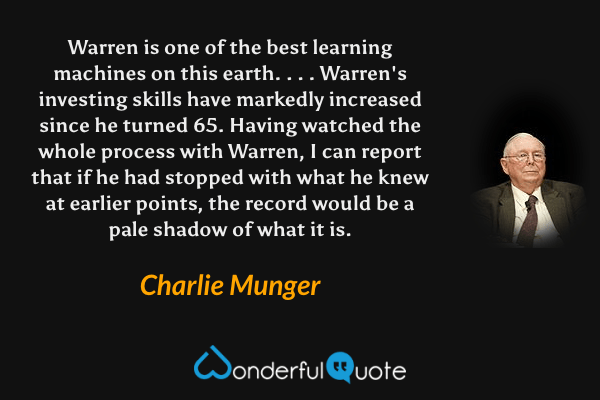
Warren is one of the best learning machines on this earth. . . . Warren's investing skills have markedly increased since he turned 65. Having watched the whole process with Warren, I can report that if he had stopped with what he knew at earlier points, the record would be a pale shadow of what it is.
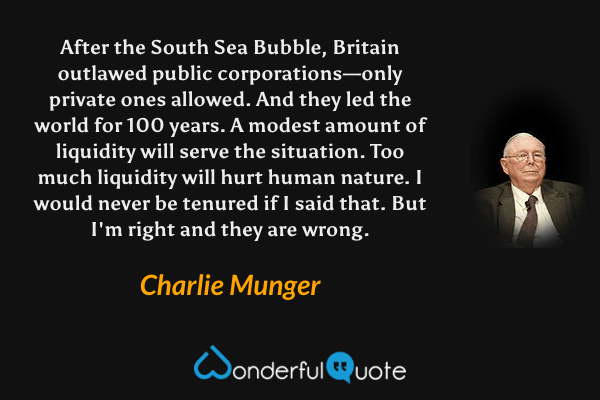
After the South Sea Bubble, Britain outlawed public corporations—only private ones allowed. And they led the world for 100 years. A modest amount of liquidity will serve the situation. Too much liquidity will hurt human nature. I would never be tenured if I said that. But I'm right and they are wrong.
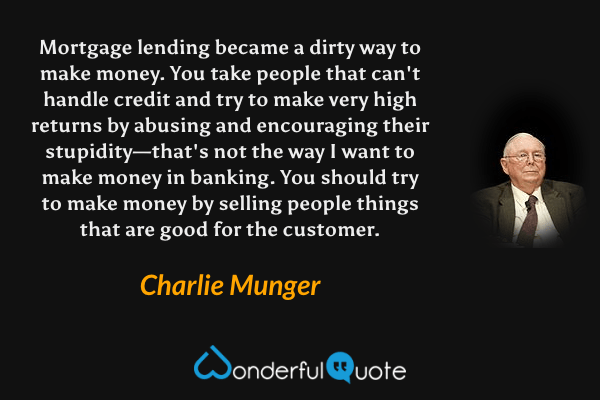
Mortgage lending became a dirty way to make money. You take people that can't handle credit and try to make very high returns by abusing and encouraging their stupidity—that's not the way I want to make money in banking. You should try to make money by selling people things that are good for the customer.
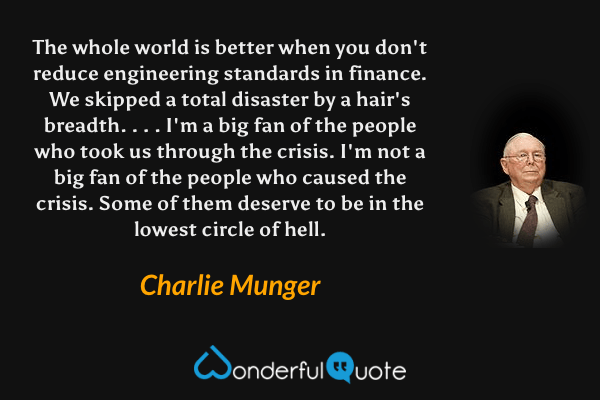
The whole world is better when you don't reduce engineering standards in finance. We skipped a total disaster by a hair's breadth. . . . I'm a big fan of the people who took us through the crisis. I'm not a big fan of the people who caused the crisis. Some of them deserve to be in the lowest circle of hell.
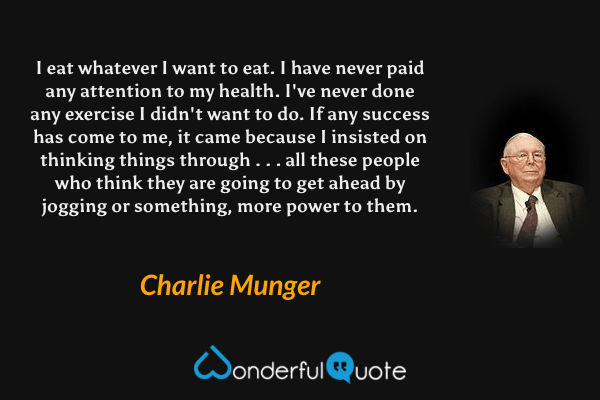
I eat whatever I want to eat. I have never paid any attention to my health. I've never done any exercise I didn't want to do. If any success has come to me, it came because I insisted on thinking things through . . . all these people who think they are going to get ahead by jogging or something, more power to them.
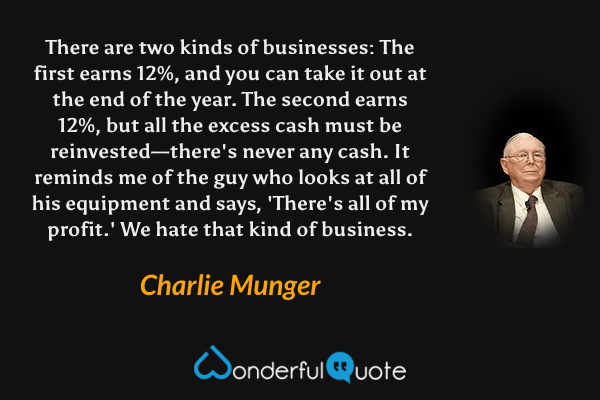
There are two kinds of businesses: The first earns 12%, and you can take it out at the end of the year. The second earns 12%, but all the excess cash must be reinvested—there's never any cash. It reminds me of the guy who looks at all of his equipment and says, 'There's all of my profit.' We hate that kind of business.
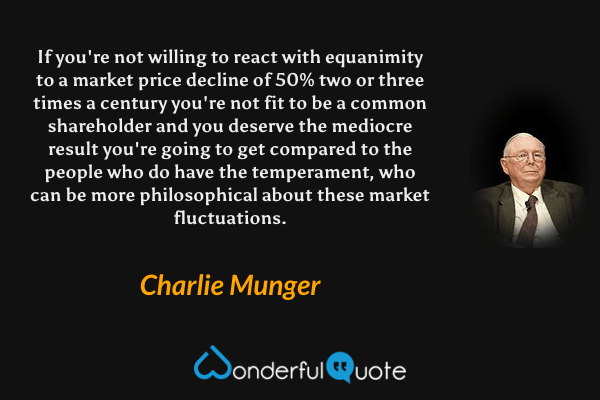
If you're not willing to react with equanimity to a market price decline of 50% two or three times a century you're not fit to be a common shareholder and you deserve the mediocre result you're going to get compared to the people who do have the temperament, who can be more philosophical about these market fluctuations.
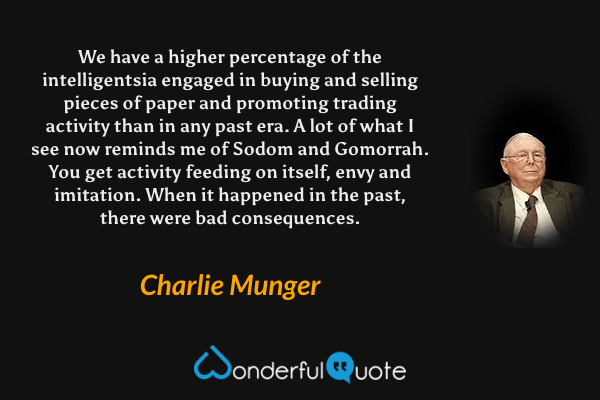
We have a higher percentage of the intelligentsia engaged in buying and selling pieces of paper and promoting trading activity than in any past era. A lot of what I see now reminds me of Sodom and Gomorrah. You get activity feeding on itself, envy and imitation. When it happened in the past, there were bad consequences.
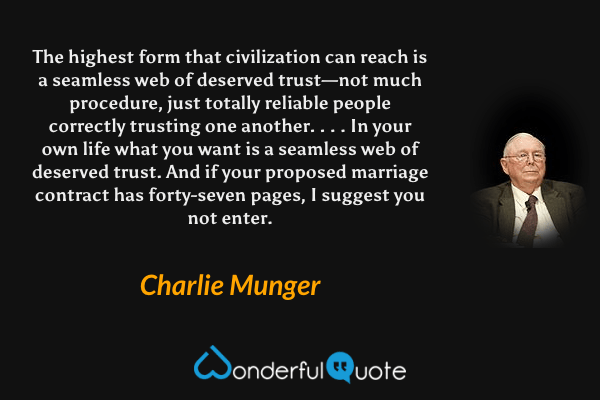
The highest form that civilization can reach is a seamless web of deserved trust—not much procedure, just totally reliable people correctly trusting one another. . . . In your own life what you want is a seamless web of deserved trust. And if your proposed marriage contract has forty-seven pages, I suggest you not enter.

These crazy booms should be watched. Alan Greenspan didn't think so. He's a capable man but he's an idiot. You should not make him the father of all banking. His hero is Ayn Rand. It's an unlikely place to look for wisdom. A lot of people think that if an ax murderer goes around killing people in a free market it's all right.
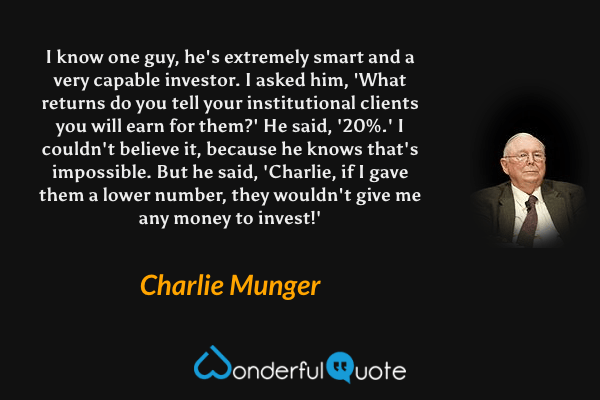
I know one guy, he's extremely smart and a very capable investor. I asked him, 'What returns do you tell your institutional clients you will earn for them?' He said, '20%.' I couldn't believe it, because he knows that's impossible. But he said, 'Charlie, if I gave them a lower number, they wouldn't give me any money to invest!'
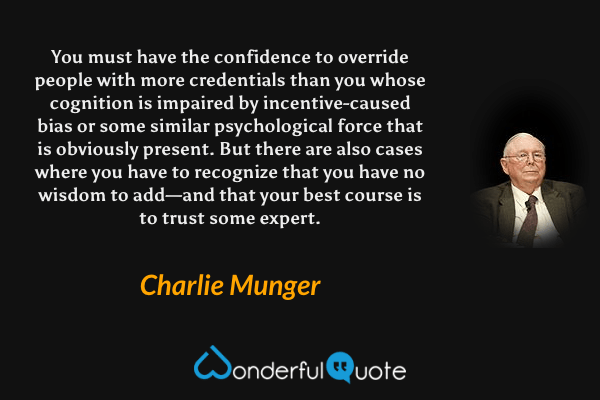
You must have the confidence to override people with more credentials than you whose cognition is impaired by incentive-caused bias or some similar psychological force that is obviously present. But there are also cases where you have to recognize that you have no wisdom to add—and that your best course is to trust some expert.
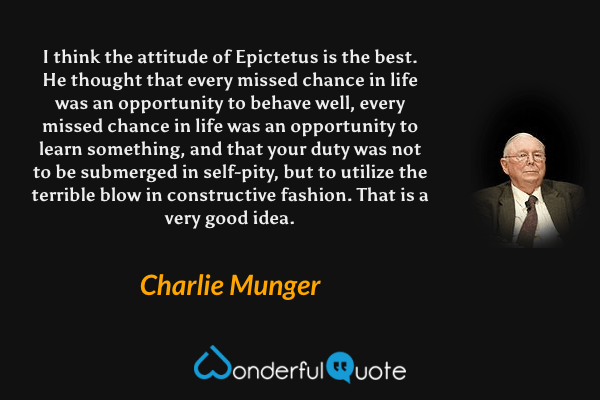
I think the attitude of Epictetus is the best. He thought that every missed chance in life was an opportunity to behave well, every missed chance in life was an opportunity to learn something, and that your duty was not to be submerged in self-pity, but to utilize the terrible blow in constructive fashion. That is a very good idea.
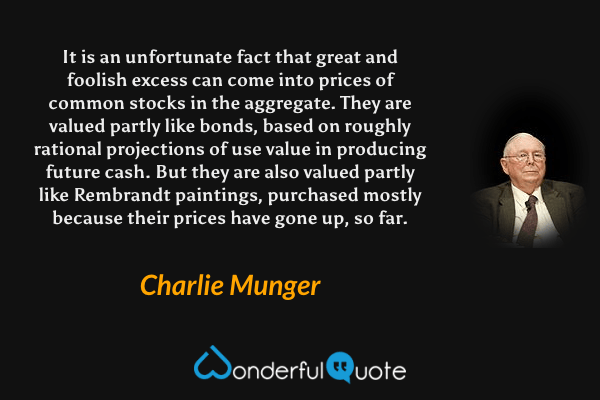
It is an unfortunate fact that great and foolish excess can come into prices of common stocks in the aggregate. They are valued partly like bonds, based on roughly rational projections of use value in producing future cash. But they are also valued partly like Rembrandt paintings, purchased mostly because their prices have gone up, so far.
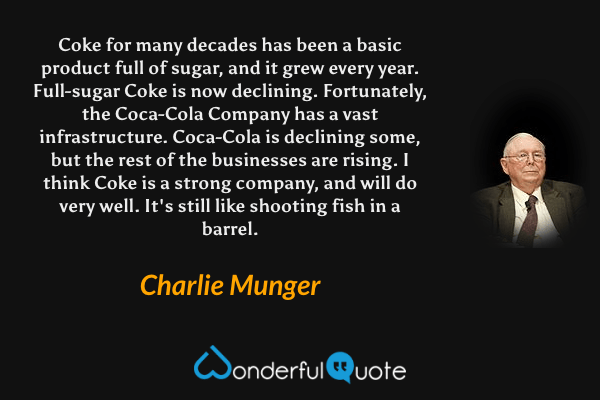
Coke for many decades has been a basic product full of sugar, and it grew every year. Full-sugar Coke is now declining. Fortunately, the Coca-Cola Company has a vast infrastructure. Coca-Cola is declining some, but the rest of the businesses are rising. I think Coke is a strong company, and will do very well. It's still like shooting fish in a barrel.
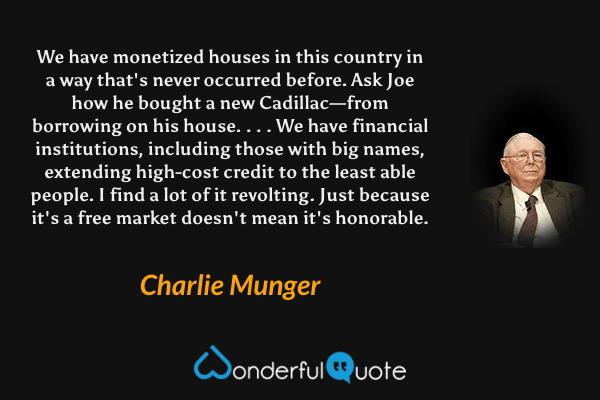
We have monetized houses in this country in a way that's never occurred before. Ask Joe how he bought a new Cadillac—from borrowing on his house. . . . We have financial institutions, including those with big names, extending high-cost credit to the least able people. I find a lot of it revolting. Just because it's a free market doesn't mean it's honorable.
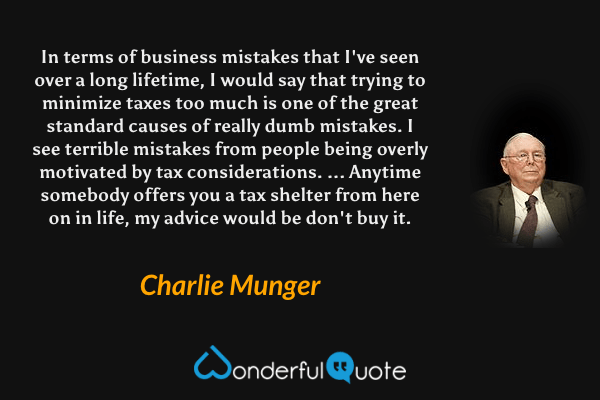
In terms of business mistakes that I've seen over a long lifetime, I would say that trying to minimize taxes too much is one of the great standard causes of really dumb mistakes. I see terrible mistakes from people being overly motivated by tax considerations. ... Anytime somebody offers you a tax shelter from here on in life, my advice would be don't buy it.
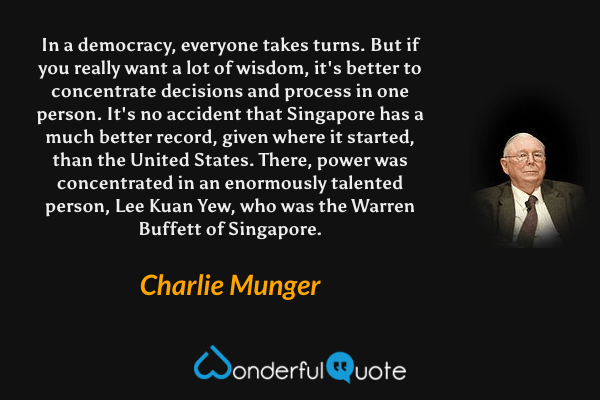
In a democracy, everyone takes turns. But if you really want a lot of wisdom, it's better to concentrate decisions and process in one person. It's no accident that Singapore has a much better record, given where it started, than the United States. There, power was concentrated in an enormously talented person, Lee Kuan Yew, who was the Warren Buffett of Singapore.
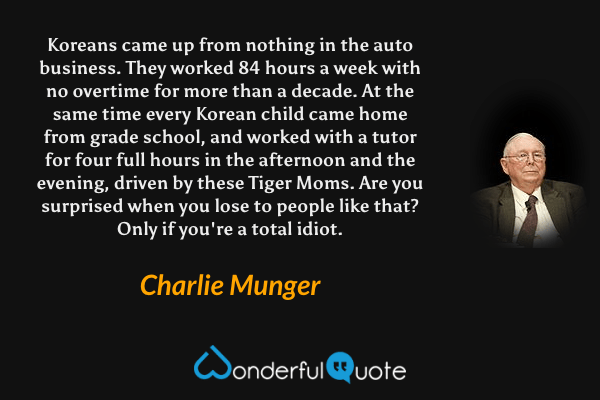
Koreans came up from nothing in the auto business. They worked 84 hours a week with no overtime for more than a decade. At the same time every Korean child came home from grade school, and worked with a tutor for four full hours in the afternoon and the evening, driven by these Tiger Moms. Are you surprised when you lose to people like that? Only if you're a total idiot.
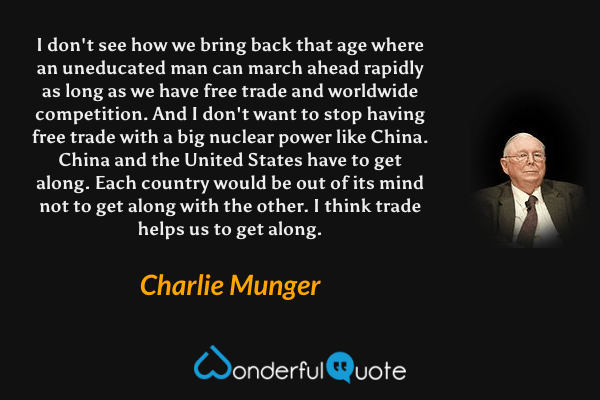
I don't see how we bring back that age where an uneducated man can march ahead rapidly as long as we have free trade and worldwide competition. And I don't want to stop having free trade with a big nuclear power like China. China and the United States have to get along. Each country would be out of its mind not to get along with the other. I think trade helps us to get along.
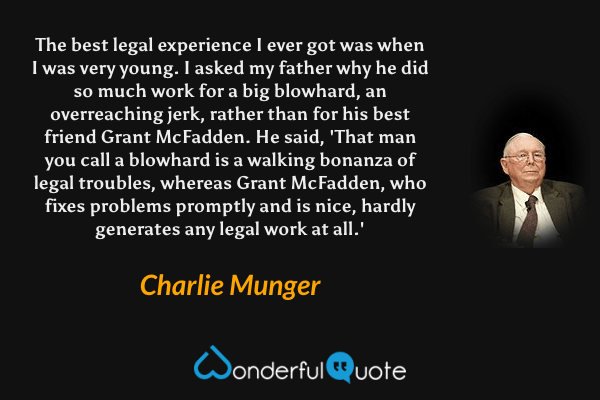
The best legal experience I ever got was when I was very young. I asked my father why he did so much work for a big blowhard, an overreaching jerk, rather than for his best friend Grant McFadden. He said, 'That man you call a blowhard is a walking bonanza of legal troubles, whereas Grant McFadden, who fixes problems promptly and is nice, hardly generates any legal work at all.'
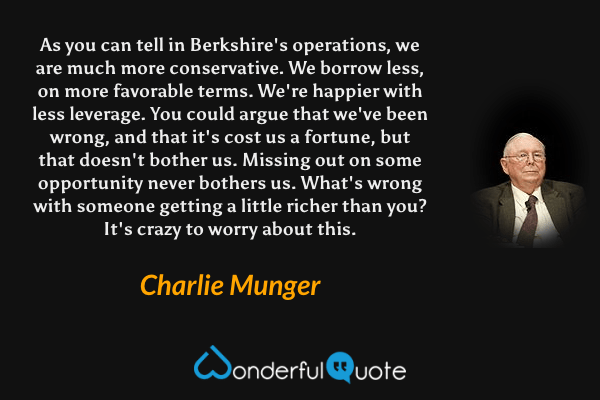
As you can tell in Berkshire's operations, we are much more conservative. We borrow less, on more favorable terms. We're happier with less leverage. You could argue that we've been wrong, and that it's cost us a fortune, but that doesn't bother us. Missing out on some opportunity never bothers us. What's wrong with someone getting a little richer than you? It's crazy to worry about this.
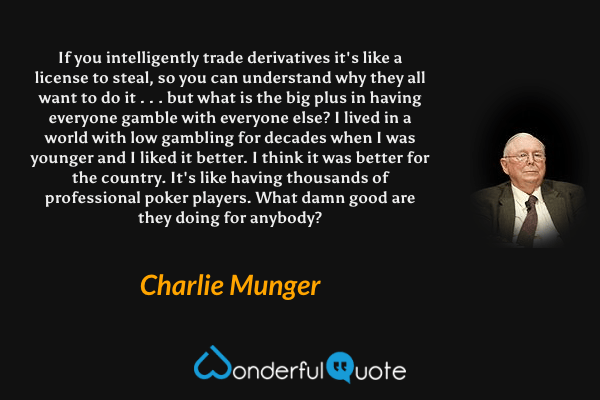
If you intelligently trade derivatives it's like a license to steal, so you can understand why they all want to do it . . . but what is the big plus in having everyone gamble with everyone else? I lived in a world with low gambling for decades when I was younger and I liked it better. I think it was better for the country. It's like having thousands of professional poker players. What damn good are they doing for anybody?
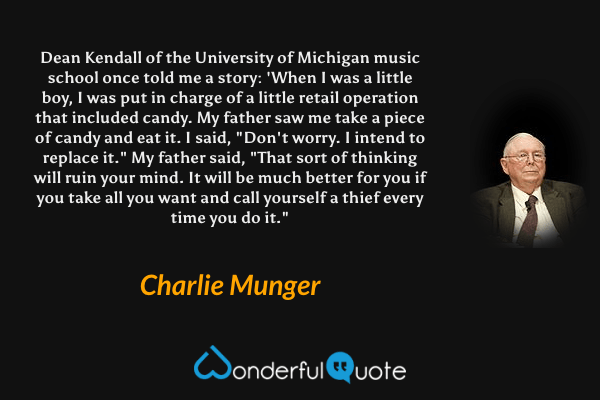
Dean Kendall of the University of Michigan music school once told me a story: 'When I was a little boy, I was put in charge of a little retail operation that included candy. My father saw me take a piece of candy and eat it. I said, "Don't worry. I intend to replace it." My father said, "That sort of thinking will ruin your mind. It will be much better for you if you take all you want and call yourself a thief every time you do it."

I think the hydrocarbon reserves in the United States are one of the most precious things we have, every bit as precious as the topsoil of Iowa. Just as I don't want to export all the topsoil in Iowa to Iran or someplace, just because they are willing to give us some money, I love the hydrocarbon reserves we have in the ground. The fashion is to be independent and to use them up as fast as we can. I think that's insanity as a national policy.
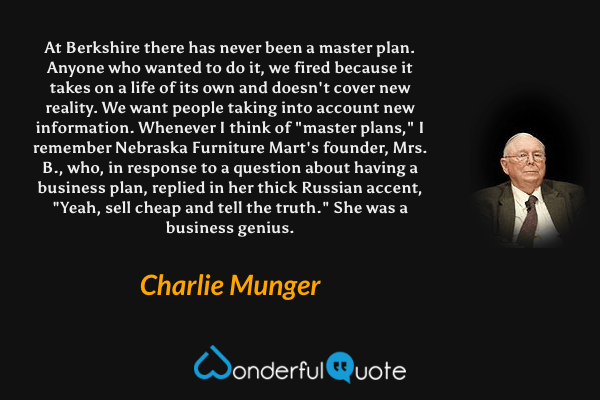
At Berkshire there has never been a master plan. Anyone who wanted to do it, we fired because it takes on a life of its own and doesn't cover new reality. We want people taking into account new information. Whenever I think of "master plans," I remember Nebraska Furniture Mart's founder, Mrs. B., who, in response to a question about having a business plan, replied in her thick Russian accent, "Yeah, sell cheap and tell the truth." She was a business genius.
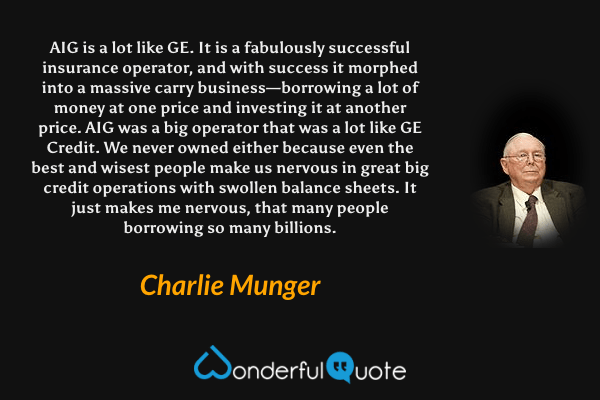
AIG is a lot like GE. It is a fabulously successful insurance operator, and with success it morphed into a massive carry business—borrowing a lot of money at one price and investing it at another price. AIG was a big operator that was a lot like GE Credit. We never owned either because even the best and wisest people make us nervous in great big credit operations with swollen balance sheets. It just makes me nervous, that many people borrowing so many billions.
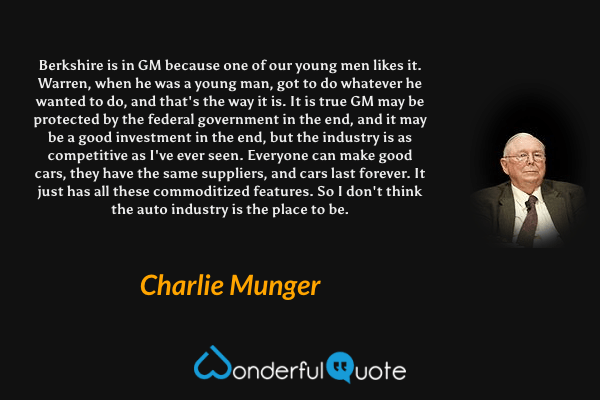
Berkshire is in GM because one of our young men likes it. Warren, when he was a young man, got to do whatever he wanted to do, and that's the way it is. It is true GM may be protected by the federal government in the end, and it may be a good investment in the end, but the industry is as competitive as I've ever seen. Everyone can make good cars, they have the same suppliers, and cars last forever. It just has all these commoditized features. So I don't think the auto industry is the place to be.


